#and how they affect suleiman
Text
Mistakes in the Magnificent Century part III
(title, ranks and traditions)
Some facts might be the same or very similar to the ones in previous parts,but they will be discussed from different angle.
1. Valide Sultan title
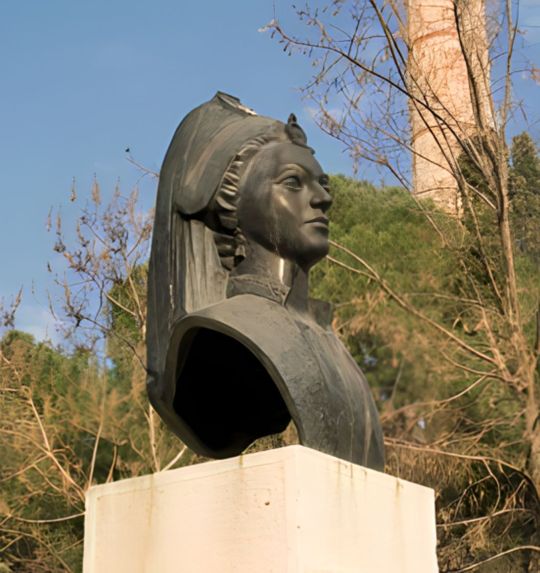
As I have spoken in the previous chapters, pre 1520 mothers of sultans were not sultans at all, they were titles as hatuns, though treated with utmost respect. In 1520 as Suleiman the Magnificent ascended the throne, he bestowed the title of Sultan to her mother Ayşe Hafsa, thus making her the first person in the ottoman history to become sultan from slavery. However, for Ayşe Hafsa being Sultan was not the same as the Valide Sultan that we know today. She was sultan yes, and she was the mother, so "Valide" was the proper address,from her children, as it was for every mother in the Ottoman empire, she was registered as "the mother of Sultan Suleiman", therefore in some sense, we can say she was not "Valide Sultan".
The first person,who actually made the "Valide sultan" a thing and officially registered herself was Nurbanu. So, the first Valide sultan with its full meaning was not Hafsa,but Nurbanu, who was registered as Valide Afife Nurbanu Sultan.
2. Haseki Sultan and Hürrem's marriage.
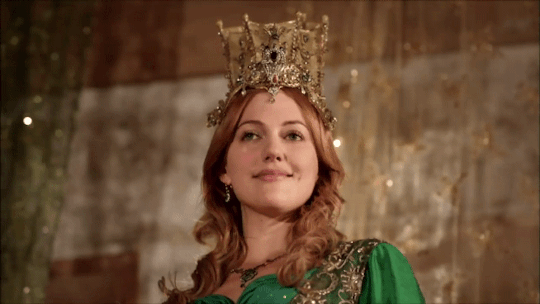
There were more than just several miscon- ceptions about the subject in the show.
First and foremost it was created specifically for Hürrem,so neither Hafsa nor Mahidevran have ever had the title. It also brought another mistake about Hafsa,that I will explain below,but now I will just make clearer how, when and why the status was created.
It was almost definitely created in mid-1534 after the death of Ayşe Hafsa Sultan and was probably legalised by their marriage, which by some sources is mentioned to be in 1533. If this is right, then it would mean, Suleiman married Hürrem before he gave her the status of Haseki and the marriage only freed her,but the most common and for me the most logical version is that after the death of Hafsa Sultan, Suleiman married her and gave her the title.
The death of Hafsa Sultan is a crucial part in the story, nor because she had some kind of objection towards Hürrem or her promotion,but the legal status of Hürrem reached its peak of necessity after her death. As we know, Ayşe Hafsa was a trusted ally and Confidant of uprising Sultan, even during his time as shehzade, so during the campaigns, his mother was the supervisor of the capital and his family, so the sultan could go to war without worrying about what he was leaving behind. However, after Hafsa's death things changed, Süleiman lost beloved mother and most trustworthy person around him, he needed to act immediately,as the campaign was near. He needed someone,whom he could entrust Harem, Family and the capital. His children were little, Sisters(whom by the way he trusted very much) were all married and Hürrem did not have a proper rank. It is said that he also discussed the candidate of high ranking harem servants, one and most promoted one of whom, in my opinion, would have been Gulfem, but he finally found the best possible solution that would affect his empire for centuries. He married Hürrem, gave her the rank of Haseki Sultan and left her in charge of the Harem, Family and the empire.
Hürrem became the first Haseki sultan in history.
Misusage of the title did not and here and there, not only the status and function,but even relevance of achievement was changed here. In the very first episode, Nigar kalfa made it clear that giving birth to a son, was enough to achieve it however, originally only the chosen ones could become Hasekis until its relevance faded during Murad's reign and completely lost exclusivity during Ibrahim's.
Essentially, the original function of haseki sultan was filling the absence of Valide, therefore only Hürrem and Nurbanu can be considered as the "original Haseki Sultans". Later many women were given the status, however the show made it wrong. Mahidevran,Mahfiruz and Halime never held it, however Şevikar, referred as Şevikar hatun in the show, was actually Haseki Şevikar sultan, the fifth Haseki of Ibrahim, three of whom, Ayşe, Mahinerv and Saçbağli, were left out, which is kind of understandable, because they had no importance in plot, unlike Turhan, never became Valide,unlike Saliha Dilaşub and Muazzez and had no influence on Ibrahim,Unlike Şevikar and Humaşah.
Their social standing is also misportrayed in the show, where Haseki ranks below and bows to imperial princesses, while in real life it was the other way around.
3. Daughters of Ottoman Princesses
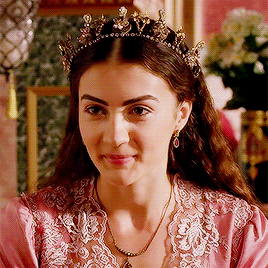
In the show, we met three daughters of the ottoman princesses: Esmahan,Huriçihan and Humaşah. They are referred to as Sultans,but in real life the daughters of imperial princesses were not called so,instead they had the title Hanimsultan and ranked even below the imperial consorts. The only exception to that was Humaşah, the daughter of Mihrimah Sultan, who received the title and prestige of the Sultan.
4. Harem Kalfa

In the show, they are just giving people the rank left and right. Nigar was already a high ranking, trusted servant of harem,but it turned out that she had only been there for 6 years. Fidan hatun was banished for attacking Sultan,but after a while she returned and became Kalfa, in Kösem melek hatun received rank out of the blue etc.
In real life, however, becoming kalfa was a long process. As we know,there were hundreds or even thousands of girls in the harem,but only a handful of them would become favourites,but what would happen to others? After ten years of being a harem resident some of them would have been transferred from harem and soon married off, some could by freedom, while others, usually the smartest and most responsible ones,would go to a special school that lasted two years, they would revive extensive training, both intellectual and physical, after that they could return in harem as teachers and overseers and if they were good enough they could promote.
There was actually quite a complicated hierarchy of harem servants,not only there were Kalfa's who had duty to supervise certain works like food or laundry(later even coffee),but there were administrative ranks, that they could achieve:
Mistress chief treasurer(Baş Hazinedar usta): she was head of the harem treasury.
Treasurers(Hazinedars): there were other hazinedars as well, who worked in harem treasury. Baş hazinedar usta was their direct superior.
Imperial Kalfa(Hünkar Kalfası): Personal kalfa of the padişah.
Lady stewardess(Kahya kadin/Kethüda Hatun): she ranked below imperial consorts,but her role raised during sultanate of women, when Gülfem and Çanfeda held the office, they were right hand women of Chief Harem managers(Hürrem and Nurbanu) therefore second in command of the Harem.
Senior Kalfa(Büyük Kalfa): Head of Kalfas, she was responsible for literally everything that was happening in the harem, sultans and şehzades treated her with respect and called "my kalfa" or "your grace"
Lady secretary: secretary of administrative organs of harem.
Junior kalfa( Küçük Kalfa): Senior kalfa was their direct superior. They had ranks within( second- ranking, third ranking, novice etc.) They were sometimes teachers and daily overseers.
Çanfeda for example entered the harem with Nurbanu, so in late 1530's or early 1540's. Nurbanu became favourite and went to Manisa, while Çanfeda remained in the old palace, in 1566 she was already a high ranking kalfa in the old palace, when Nurbanu called her. That would mean she was sent to train as kalfa in late 1540's or yearly 1550's, therefore she would have a decade or two to raise in ranks.
5. Princely harem.

In the magnificent century, prince usually gets his harem, whole in Topkapi palace, which is the lie through and through. They went even further and made up with the rule that the prince can not have a child with their concubine until they get their province to rule. Why would they be allowed to have concubines,but not having a child, when contraception is still unreliable.
Actually, their case was far more easier, princes would revive their sanjaks while still very young, their mothers, governesses and close servants would carefully choose their harem and leave the palace with their mother and full sisters. That also brought another mistake in the show. In the flashbacks, we can see Ayşe Hafsa and Hatice visiting Suleiman in Manisa, however Ayşe Hafsa along with Fatma and beyhan left for Manisa with Suleiman in 1512, while Hatice,being 4 years older than Suleiman, got married the same year.
6. Regency
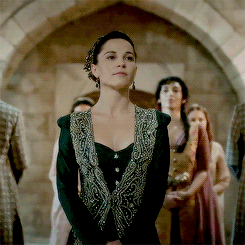
They introduced Kösem's regency as something unheard of,while completely neglecting Handan and Halime.
Handan was the first woman ever to rule as regents in her son's stead. She appointed viziers, discussed political matters and built a trusted circle for her son.
Halime was not officially registered regent but due to the insanity of her son, paşas asked her to rule the state after the rebellion she herself organized.
Kösem's and Turhan's regency is well known, so I will not speak about it.
7. Kösem's wedding

Not exactly the mistake as it is not proven, but as the event is highly unlike, I'll just put it there.
In 1609 it is said that Ahmed had four children with two women,but neither of them were married to him. In the two latters, one form 1612 and other from 1616, the 1612 letter straight out mentions her as sultan's concubine, who he loves the most and in 1616 she is mentioned as juts Haseki,but nothing is said about the marriage( I am not adamant about him not marrying her,I am just saying that it's unlikely, however I admitt she might indeed was concubine in 1612 and after the death of Mahfiruz, Ahmed married her and raised her stipend),however early in Kösem's regency vencians questioned ottoman practice, that mother of sultan was honoured and even given the regency,despite not being married to his father. As we know in Venice and generaly in Europe, source of power for woman was her marriage and not just motherhood. That is a time, when it was "unrevealed" that ahemd married her before he died,(if that latter is to be believed than Kösem and Ahmed did not marry in 1613), now it was actually thought that it was false information used by Kösem to strengthen her position in the eye of Venice as they needed friendly relation with them. That is not widely accepted,but it can be strengthened by the fact that Vencians still did not believe it, so perhaps they knew for sure that it was lie?
8. The death of Halime sultan and Mustafa.

In the show Halime, like many others, is victim of making Kösem seem more powerful, while Mustafa was killed by Murad. In real life, Mustafa died of natural causes, probably because of epilepsy in 1539, he was buried in Hagia Sophia and the coffin was placed in a mosque built for him. Halime is buried next to him and no permission of reburial was asked or granted, therefore Halime was not killed by Kösem, she went to the old palace and lived a long life.
9. 1517-1540
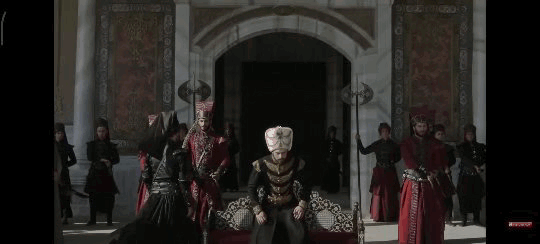
I'll be honest, I don't remember much of those episodes, they were boring and monotonous for me, but what I remember is one part from Kösem's iconic " The state you are talking about is mine" speech. She mentioned that she took over the reins of the state from Ahmed 15 years before the event, well that is a huge lie. Though the show runners tried to make Kösem all powerful, the invincible mastermind behind every single breath people drew in the empire,but she was actually quite powerless from time to time and the period between 1617 and 1623 is one of such. She was still young and inexperienced that time and main powerhouses in the empire were Halime and Osman's faction and she was not the leading force during any of the rebellions, she was allie of Halime, who, according to many historians, had major influence that time and the great impact on Kösem. Some even go as far as claiming that she persuaded Osman to kill Mehmed, so Kösem would take her side.
In short, Kösem did not have reins of sultanate for 15 years,but only about 10.
As I said, I don't remember much about the episodes, but from what I remember, Kösem had something to do with Murad's death. I'll be short on this: that's a lie.
10. Coup of 1648

The show made Kösem something of a filicidal tyrant. However, In real life her tyrannical tendencies appeared only after the death of Ibrahim, which he had nothing to do with. The ones behind the incident were Turhan and her faction. Kösem indeed took part in the Ibrahim's dethronement for the good of everyone,but mainly because she had seen the mad sultan dethroned,but lived. Mustafa had a similar situation,he was dethroned and locked in kafe, while his mother was sent to the old palace, which Kösem was absolutely willing to do. However, Turhan made her move and had Ibrahim executed to get rid of opposition for good, or perhaps because of the old resentment. Things did not go exactly as she had planned though, Kösem became regent and visibly started to avenge Ibrahim's death, it became clear that she was not going to hand over any power to Turhan and after she started to oppose even went as far as attempted dethronement of Mehmed(however she was not going to kill him.)
Therefore the child killing monster the show made her become is straight out a lie. One of her sons died of natural causes and the other was killed by outer forces, that she tried to avenge.
#history#historical drama#16th century#magnificent century#magnificent century kosem#mc: kosem#ottoman empire#ottomanladies#historical events#historical figures#sultanate of women#haseki hurrem sultan#hurrem sultan#nurbanu sultan#kosem sultan#safiye sultan#muhtesem yuzil kosem#historyedit#historical#ottoman sultanas#ottoman history#ottoman#mistakes in the magnificent century
147 notes
·
View notes
Note
Hi!
Sorry English is not my native language, I will make mistakes.
First.
I love your lyrics! they are amazing!!
I am ready to kiss your amazing diligent hands (of course with your consent)
Your texts make me smile stupidly and giggle softly like a schoolgirl who was invited by the most enviable person from the whole school to an event.
So, I'm here because of that post with Howl's Walking Castle.
Good, good. Vil is the Witch of the Wasteland.
Then……Rook Hunt……… Is this Howl? (Not Jack)
Blond? Yes
Short hair with a square and straight bangs? Yes.
A charming wizard? YEAS
Perhaps in the past, the paths of Vil and Rook diverged because of the views on the world and goals in life that have changed over time. But they warmly remembered their friendship and their small events.
Now I can't get rid of the story that the Rook is a Howl.
He am very upset that Suleiman has taken away the magic Power from his dearest friend - Vil. With whom they once studied together with the aforementioned sorceress.
And now this crazy woman is hunting for all the sorcerers, wizards, magicians to sentence to eternal work for a stupid king and endless wars?
No.
He won't stand for it. But what can he do now that his magic power has become so unstable because of the curse?
He almost loses himself.
****
Rook - aka Howl. He was so fascinated by the ignorant owner of the hats turned into an old man. Come to his endlessly walking castle - to avoid the oath.
With a strong request that they need a job. And the castle passed by their town very "in time", and they could well take up cleaning in the castle.
Speaking of cleaning….
Rook looks around with embarrassment at its castle overgrown with dust and cobwebs. With a bunch of different stuff and "loot" from his secret hunt.
Oh, what a shame. He is so embarrassed that his house looks so inhospitable to others.
Since that day, Rook has noticed significant improvements in its castle.
Cleanliness replaced all the garbage and dirt. The ashes no longer scatter all over the living room, unpleasantly tickling the nose.
Everything is tidy, shining with gloss, as if delivered just from the store. Products no longer spoil due to the fact that they forgot to remove or cook. While the owner himself is running around outside the castle on his own business…
The clothes smell pleasantly of powder and salty air from the shore of sapphire lake. Maybe a pinch of pollen from flower meadows.
How much energy is contained in this "cursed old man"?!
****
Forgive me for my invention, but what if the Damned Hat Seller has a very strong magician friend from another country?
Wil is horrified looking at the letter with the coat of arms which he swore that he had seen only Suliman on very rare documents, one or two no more.
-Where… is it from…a letter?
-Oh, it's that statue guy! So, my letter with the address reached him!! - The cursed owner of hats looks with affection at a black raven with a green short ribbon on its paw holding a rather weighty letter.
Vil and Rook look at each other in complete confusion, uttering the unvoiced question "What's going on?!"
-Who?
-Ah… well…Tsunotaro? I was talking about him. This guy was cursed into a stone statue. The poor guy can only move by jumping…..He was very kind to me. When… well….I had to leave my city.
Briefly quieting down and feeling extremely awkward and painful memories of the past, they change the subject.
-He helped me get to the hills. He made me a cane out of a prickly blackberry bush. He said there might be some magicians here who could give me a job. Due to the fact that they are often on the road, there is no one to look after their homes. And I can be hired for a pretty good fee, or just as an assistant…When we helped with his curse, he said that he was now in my debt for the rest of his life….Oh, he writes that he is very glad to know that I am doing well! And yes……I….um….I'm sorry, I asked about your situation…he said that this could easily solve the problem. There's some magical gibberish, I don't really understand it…
-Wait a minute……….. are you saying that you lifted the curse from that stone demon?!
-First of all, he is not a demon. And secondly, he was very polite…Unlike one person who just cursed me at the first meeting. . Third, he seems to be a prince? Now he is putting things in order in his country while he was away a lot of work has accumulated.
Vil rolls his eyes. The old record again.
-I told you I can only cast curses, not remove them. Who even thinks of such a thing?!
-Oooooh, really?And look what this has led you to, "Mr. crunches back is even worse than mine" is only worth turning your head.
-Oh, are you!!YOU!!YOU!!
Vil tries to throw a pillow at the wit from his seat.But it was a futile attempt.
The damned owner atelier of the hats suddenly starts laughing merrily.
And their curse weakens for a moment.
They are young again. Their previously wrinkled cheeks are now decorated with a healthy bright blush. Their hair is no longer gray, their laughter is not hoarse and raspy, but sonorous and pleasant.
It only lasts for a moment, and then time devours their body again for the curse.
Schoenheit wants to go back to the past and knock himself out of the past so as not to curse this person…and enjoy this laughter and embarrassed giggling more.
Rook just smiles meekly - Ah, it seems that help will come to us from where we did not expect it at all. Isn't that wonderful~
****
Oh, yeah….
I think Epel is Markle.
The guy who works instead of Rook while he wanders somewhere outside the castle. And sells potions and herbs for the townspeople in their shops. He gives the money to his family in one of the villages.
Epel at the sight of Vil - ARE YOU CRAZY, IT'S THE WITCH OF THE WASTELAND?!
Vil leaning on the hands of the Cursed MC to sit down on the sofa, because there was no trace of his previously imperious light, confident gait. - what a loud ill-mannered child..
-I know, but now this grandfather is not dangerous. Vill you put the kettle on, Epel? I'll cook dinner.
-Grandfather?!Excuse me???How dare you address me like that?!I am a great magician and wizard!!No one even dared to cast an unwanted glance at me for a split second!!
-Yeah-yeah, calm down…are you going to eat porridge?
-I hate you…
-Well, you don't have much choice. Or you stay here and you don't have enough problems. Or you get up on your own and leave here on your own two feet since you don't like it here. - The damned MC snorts, taking out an apron and groceries to cook dinner. Easily and confidently soaring in the kitchen to cook everything on time.
-Damn it…..I cursed you to be an elderly man, a crumbling, decrepit crone…and you have more energy than 10 young men and women combined…I don't understand where you got it from…
-Oh, look, he's already started grumbling like a grandfather~
-IT WAS WORTH TURNING YOU INTO A PUMPKIN AND PUREING YOU AND FEEDING YOU TO GEESE!!
Epel covering the ears - MC….why did you bring this angry, loud old man into our house?..
The damned Mc only giggles merrily, covering his smile with his palm, watching the exchange of these two.
Suddenly a thought strikes them.
-Oh shit…..I should have asked the Hunter's permission…it's not my house…
I'm sorry it was too long.ahaha..
I can't believe I never considered using Rook as Howl. My guys have the same blonde bob and everything.
But yes! I'm glad I can drag more people into this Howl AU hell with me
54 notes
·
View notes
Note
This question is a bit too in general maybe? but what do you know about Ibrahim and Süleyman's real life relationship. Like was it an actual friendship/purely professional/something else more personal? Like the show does leave some questions and I've heard a lot of different things abt them over the years, don't know how much of it are rumours, how much of it is real
Honestly, while the show no doubt romanticizes it in places (I can't find any evidence of Suleiman taking a vow to safeguard Ibrahim's life, for example), a lot of what's depicted in regards to the nature of their relationship is at least somewhat factual. Ironically, despite the remarks I still occasionally stumble across about Mahidevran having been Suleiman's "favorite" before Hürrem, it actually seems like that position belonged to Ibrahim, if in a strictly platonic sense.
"The sultan's affection for both was intense, wrote Bragadin: Suleyman focused all his love on Roxelana, ignoring Mustafa's mother, and people said that he would have perished from sorrow had Ibrahim stayed any longer on his mission in 1525 to restore order in Egypt. As usual, the Venetian knew a good story when they saw one, especially when it came to Ibrahim, to whom they enjoyed more than the usual access."–Peirce, Leslie. Empress of the East: How a European Slave Girl Became Queen of the Ottoman Empire
His elevation, which happened much like in the show, was considered shocking as well since:
"Suleyman's other viziers had worked their way up the ranks, gaining years of experience in government. They had earned their status; Ibrahim was given his."–Peirce, Leslie. Empress of the East: How a European Slave Girl Became Queen of the Ottoman Empire
Really, the bigger misdirect is the relationship that Ibrahim has with Hürrem in the show, which, in reality, was probably affable, if not always on the steadiest ground. The entire concept of her having had a hand in Ibrahim's death as well is a thing that became fabricated later as it doesn't even seem as if her contemporaries and the Ottoman public believed in such a thing after the execution occurred.
"But perhaps it was inevitable that those two individuals, who rose simultaneously, at the very outset of Suleyman's reign, as his favorites, were assumed, at least by later historians, to be rivals who would do anything to impede the others influence on the sutlan. The absence of a smoking gun, however, does not mean that Roxelana had no opinions regarding the man who occupied much of Suleyman's attention for the first thirteen years of her life with him or that she kept those opinions to herself. No one could be silent on the matter of Ibrahim, it seemed. He became controversial well before she did."–Peirce, Leslie. Empress of the East: How a European Slave Girl Became Queen of the Ottoman Empire
If I had to apply a more subjective outlook to things, I think that, given the nature of the Ottoman Empire to warp most regular familial bonds, Ibrahim offered a safe alternative by serving as a surrogate brother for Suleiman. Except, in a cruel twist of irony, even that would become too much when the position to which Suleiman had risen Ibrahim to began to challenge his own authority. (To be fair, that had less to do with Irbahim's own actions and everything to do with how Suleiman had elevated him in the first place.)
11 notes
·
View notes
Note
I think part of the reason Hurrem is so anxious about Suleiman ignoring her or dismissing her (to the point she has nightmares about it) in S4 is bc she remembered what he did to Ibrahim. He never let Ibrahim or anyone else besides the judge know what he was thinking about doing, not even her. Hurrem loves Suleiman but she’s not blind to his flaws or the darker aspects of his character. He has, due to his power and position, this ability to justify his actions to himself and she knows deep down that if he could do what he did to Ibrahim (his oldest friend and his brother-in-law) he could do it to her too.
I also think this ties into a lot of what Hurrem was dealing with in season 2-3. She says to herself a lot that she won’t end up like Mahidevran which means she does acknowledge that Suleiman and Mahidevran were once very much in love and Suleiman was able to completely move on from Mahidevran which led to both Mahidevran and her son falling out of the sultan’s favor. She loves in a germ system which means that at any time there are literally dozens of women who could come in and replace her in the sultan’s affections.
All of this yes. She is all too aware of how tenuous her position is and she's willing to do what it takes to survive as long as she can but she knows full well that she is in danger.
Also I will point out about the nightmares that Hürrem has had nightmares ever since season 1. And they often revolve specifically around her abandonment issues. She sees her family and then they disappear, she watches Leo die, there's her recurring dream about searching the palace and finding it empty, Her nightmares about Süleyman are a part of a larger trend.
2 notes
·
View notes
Text
By • Olalekan Fagbade
Adamawa CP angry as Military Personnel kill Policeman in Soldiers attack
The Commissioner of Police in charge of Adamawa State Command [CP] Afolabi Babatola, has warned that attack on his men would not be tolerated.
The CP stated this few moments after the Adamawa State Police Command headquarters came under gun attack.
A resident had narrated how gunmen attacked the command in the heart of Jimeta community in Yola North local government area, throwing many into panic.
Although Police Public Relations Officer, SP Suleiman Yahaya Nguroje, confirmed the attack to Daily Trust, he had said the identities of those behind it was unknown.
Adamawa is one of the North-East states affected by insurgency, fueling suspicion that Boko Haram fighters may be responsible.
But in a statement on Wednesday, Nguroje quoted Babatola as confirming that there was a conflict between his men and military officers.
He said a police inspector identified as Jacob Daniel was killed in a gunfire exchange at Target Junction in Yola North Local Government Area of the state.
Babalola, who ordered a probe of the incident, said the command holds the lives of police officers as sacrosanct.
“The Commissioner of police CP Afolabi Babatola , has strongly condemned the recent conflict between Police and Military Officers along Target Junction, Yola North Local Government Area, that resulted in exchange of fire and Brutal attacked on the Police Facility and killing of Inspector Jacob Daniel.”
“Consequently, the CP has ordered an immediate investigation into the matter with a view to ensuring peace and justice. The CP warned that attacks on all security officers in the line of duty would no longer be tolerated under whatever guise, as the Command holds the lives of all security personnel sacrosanct, and such unwarranted conflict would be strictly treated in accordance with extant laws.
“He equally reiterated the commitment of the Command to protection of lives and property while stressing that it is vital to work with other sister security agents in protecting the fundamental rights of security operatives, in order to enable them advance their sacred mandate of serving and protecting the citizens better.
“The police Boss appeal for calm as the top Management of both security agencies are doing everything legally possible to address the situation,” read a statement issued by spokesperson of the police command.
0 notes
Text
How to Become a Successful Techpreneur

A techpreneur is someone who combines technological innovation with entrepreneurial skills to create and grow a business. Techpreneurs are often behind some of the most successful and disruptive companies in the world, such as Google, Facebook, Amazon, and Tesla. But how can you become a successful techpreneur yourself? Here are some tips to help you on your journey.
1. Find a problem worth solving. The first step to becoming a successful techpreneur is to identify a real problem that affects a large number of people and that has not been solved satisfactorily by existing solutions. This will help you create a product or service that has a clear value proposition and a strong market demand.
2. Build a minimum viable product (MVP). A MVP is a version of your product or service that has just enough features to test your assumptions and get feedback from potential customers. A MVP helps you validate your idea, learn from your mistakes, and iterate quickly without wasting time and money on building something that nobody wants.
3. Seek feedback and validation. The next step is to get your MVP in front of your target audience and collect as much feedback and validation as possible. You can use various methods such as surveys, interviews, focus groups, beta testing, landing pages, etc. to gather data and insights on what works and what doesn't work for your customers. This will help you improve your product or service and find your product-market fit.
4. Scale and grow your business. Once you have validated your product or service and found your product-market fit, you can start scaling and growing your business. This involves finding ways to reach more customers, increase your revenue, reduce your costs, optimize your operations, and expand your team. You can also look for opportunities to partner with other businesses, raise funding from investors, or enter new markets.
5. Keep learning and innovating. The last tip is to never stop learning and innovating as a techpreneur. Technology is constantly evolving and so are customer needs and expectations. You need to stay on top of the latest trends, developments, and opportunities in your industry and beyond. You also need to keep experimenting with new ideas, features, and strategies to stay ahead of the competition and delight your customers.
Becoming a successful techpreneur is not easy, but it is possible if you follow these tips and have a passion for solving problems with technology. Remember that success is not a destination, but a journey that requires constant learning, adaptation, and improvement.
Khalil Suleiman Halilu - Get inspired by the success stories of Nigerian &African entrepreneurs. Best polo player & social entrepreneurs.
0 notes
Text
[ad_1]
Tribal sentiment is tearing the Labour Party apart in Kogi State. In this report we take a look at the crisis rocking the Party and the possibility of its Presidential Candidate, Mr. Peter Obi winning the State in the 2023 presidential election.
The Labour Party, which happens to be one of the opposition parties to the ruling All Progressives Congress, (APC) in Kogi State, has been gradually gaining ground. However, it is now enmeshed with crisis bothering on tribal lines.
Several factions have emerged in the party, which could affect their performance in the 2023 election, both at the Federal and State Government.
DAILY POST gathered that the battle of who controls the party in Kogi State has taken a new twist as two major tribes feel cheated as it concerns the day to day running of the political affairs of the party in the State.
People from the Central part of Kogi State are alleging that the party members from the Eastern part of Kogi State have hijacked the Labour
Party. This is also the position of some aggrieved Labour Party members in the Western Senatorial Districts.
A party source, who never wanted his name mentioned, described the present leadership of the Labour Party, led by Hon. Suleiman Abdul Ahmed as the biggest scam of the century.
The source said, “The present leadership of Labour Party in Kogi State are jokers. They have already tribalized the Labour Party in Kogi. You can say anything because you don’t belong to their faction or tribe.
“I am not seeing our party making success with this development. I overheard the Chairman speaking at a press conference that the party is not divided. These are lies. He is running away from the truth. The Labour Party in Kogi State is now an ethnic agenda.
“Just look at the population of party officials that attended our presidential candidate rally on Tuesday held at the Confluence Stadium Lokoja. You would agree with me that only a few party officials loyal to the embattled Chairman were present. The National Secretariat should call the present leadership in Kogi to order before our party fails outrightly in the 2023 general election.”
No Factions in Kogi Labour Party- Chairman
However, the Kogi State Chairman of the Party, Hon. Suleiman Abdul Ahmed has debunked media reports that the party is now divided on ethnic lines and has several factions.
Speaking to DAILY POST, Ahmed accused the ruling party of using some bad elements in the party to cause chaos.
According to the Labour Party Chairman, the All Progressives Congress- led Government in Kogi State, instead of concentrating on policies that would attract development, are busy clamping down on other political parties, raising false alarm in the State.
“There is no division in the Labour Party. Those saying all these are doing that for their own selfish interests. The Labour Party belongs to all Nigerians and not for a particular tribe in the State. Mischief makers are scared of the rising political profile of the Labour Party in Kogi State, so they are eager to see how they can divide the party. We also know that there are people who are paid by the incumbent.
“People who have ruled this State and ruined it, people who for so many years have not been paying salaries. Even when they try to pay, they will pay it in percentage. People who have also made up their minds that the State should go into retrogression, instead of progress. They already know that the people will reject them at the poll, all that is paramount to them is to cause disunity in the party,” he added.
PCC, State Executive to be summoned to Abuja
Sources within the Labour Party have indicated that the Presidential Campaign Councils in Kogi State, alongside the State Executive will be summoned to Abuja to give an account of how funds were spent on Mr. Peter Obi’s campaign in Kogi State.
According to the source, Obi was not happy with what he saw when he visited Kogi State on Tuesday. The source had accused the party executive of syphoning funds meant for the success of the presidential campaign of the Labour Party.
The source said, “Hell will soon let loose in the Labour Party in Kogi State. I can confirm to you that the PCC of the Labour Party in Kogi, alongside the State Executive will be invited to Abuja to tell the world how they spent money used for our campaign in Kogi State.
“Just look at the low turnout yesterday. It was due to their poor preparation and lack of mobilisation across the 21 Local Government Areas of Kogi State.
“These People collected millions of naira from the National Secretariat but had nothing to show for it. I feel they are working for the APC and the PDP in Kogi State to win the election instead of our Party. We can’t continue like this. The Party is really divided, and it is time for the national Secretariat to intervene quickly before the Labour Party loses Kogi State in 2023.”
[ad_2]
0 notes
Photo








ɪ ᴋɴᴏᴡ ᴡʜᴏ ɪ ᴀᴍ... ʙᴜᴛ ᴅᴏᴇꜱ ʜᴇ ᴋɴᴏᴡ ᴛʜᴀᴛ ʜᴇ ɪꜱ ᴍʏ ꜱᴜɴ? ᴍᴀʏ ʜᴇ ɴᴇᴠᴇʀ ᴋɴᴏᴡ!
İbrahim Pasha had been born a Venetian subject at Parga, on the Ionian coast opposite Corfu, and after his capture by the Ottomans had served in Süleyman’s household in Manisa when he was prince-governor of Saruhan. Almost as soon as he became sultan, Süleyman publicly demonstrated the favour in which he held İbrahim by building him a magnificent palace on the Hippodrome in Istanbul. Having inherited his first grand vezir, Piri Mehmed Pasha, from his father, Süleyman appointed İbrahim to succeed him. Such promotion of someone who was not a vezir but a senior officer of the Sultan’s household was extraordinary. - Caroline Finkel, Osman’s Dream: The History of the Ottoman Empire
Among all viziers and servants of Süleyman, no one ever enjoyed the sultan’s favour as much Ibrahim. From the moment that he mounted the throne, Süleyman presented Ibrahim in public as his beloved friend, with whom he wanted to share all that he had, including his royal prerogatives. Described by the Venetians as the sultan’s “breath and heart”, Ibrahim was showered with myriad favours, including the most beautiful palaces horses, jewels, robes, slaves, and camels, which in splendour and magnificence matched only the sultan’s own. (...) No official from the imperial council, not even the grand vizier was allowed to enter the sultan’s private quarters. The council members were rather received by the sultan in the Chamber of Petitions (...) Ibrahim, however, continued to have immediate access to the sultan in the inner court, even after his elevation to grand vizierate. The Venetian bailo Pietro Bragadino noted in 1526 that Süleyman and Ibrahim would sleep in the same bed, their heads touching. - Ebru Turan, The Marriage of Ibrahim Pasha
Ibrahim was, according to the English writer Knolles, the most magnificent and powerful of all Ottoman grand viziers: "He in magnificence, power and authoritie farre exceeded all the rest of the Bassas." A royal document issued in 1526 granted him almost complete power as the sultan's alter-ego. Born in Parga, on Venetian territory, Ibrahim was a strong supporter of the Serenissima's Levantine trade. The bailo Pietro Bragadino reports that this pro-Venetian grand vizier was not only fond of reading the lives of classical heroes like Hannibal and Alexander the Great, but that he also avidly gathered intelligence about contemporary monarchs. Wearing many jeweled rings and dressed more lavishly than the sultan, he "bought almost every fancy object he could acquire." In 1530-31 he had insistently requested a unicorn horn from the Venetian Senate, a treasure that was presented ceremonially to the sultan as a token of the Serenissima's friendship with the Sublime Porte.- Gülru Necipoğlu, Süleyman the Magnificent and the Representation of Power in the Context of Ottoman-Hapsburg-Papal Rivalry
Happy (very belated) birthday @latristereina!
#historyedit#perioddramaedit#ibrahim pasha#suleiman the magnificent#magnificent century#mcedit#muhteşem yüzyıl#*mine#hope you enjoy it dear#rewatching some mys4 and damn#ibrahim's posthomous commentary and monologues#and how they affect suleiman#and then he buries the diary before mustafa's execution where his mosque is to be built#and then ibrahim's voice appears on his deathbed after long break#damn good stuff#same with the continued rivalry from grave between him and hurrem#now it's me rambling again :)#ottoman history#Ibrahim's diary is fictional of course ;)
129 notes
·
View notes
Text
The Sultan Who Loved Her
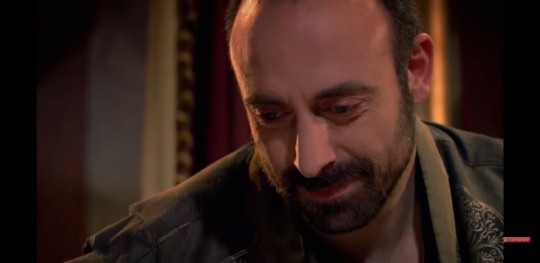
Regarding the show, Muhtezem Yuzyl or Magnificent Century, I read many negative comments about Hurrem.

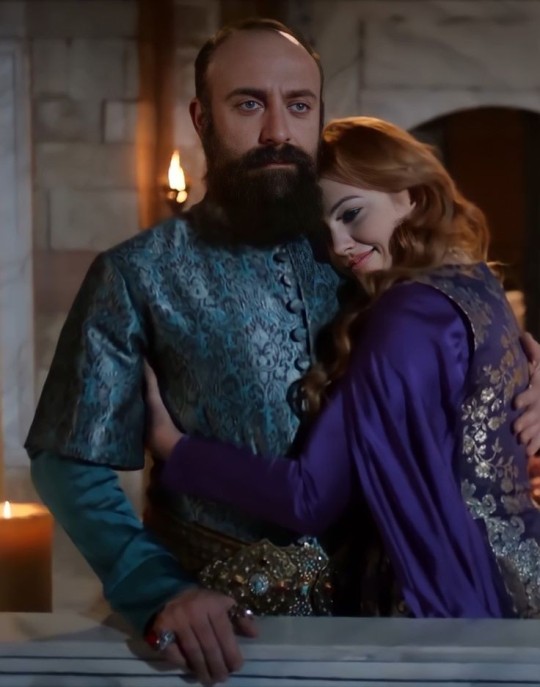
Certainly first of all the show is filled with fictionalized emotionalism. Soap opera. Well acted but this is the truth.

Moreover, in the context of this show, Hurrem was thrown in the dungeon, they tried to marry her off - cute guy, but still. Mahidevran beat her up and got Gulshah to poison her. They took a dagger to her and even stabbed her best friend. They killed her horse. Below the belt.
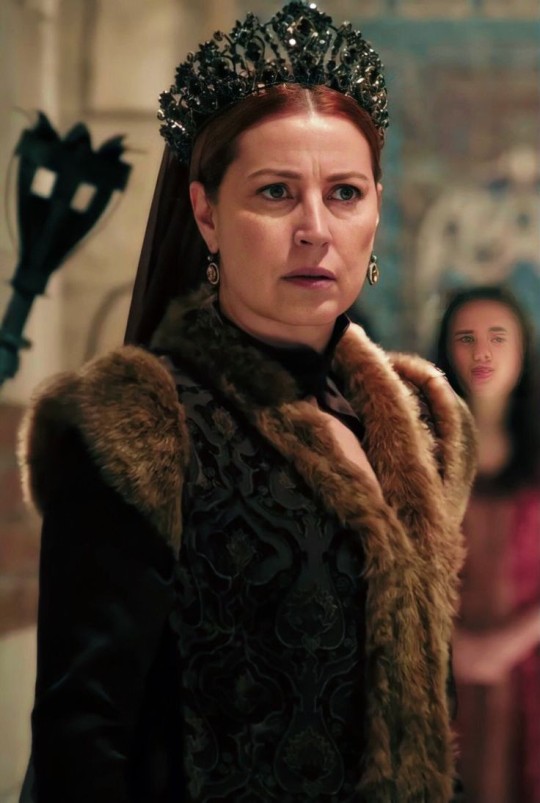
They deliberately burnt her face. They cast a spell on her that was in the end a black smoke incense in her room that was drugging her and causing hallucinations and weird behavior. They set bandits on her and tried to kill her.
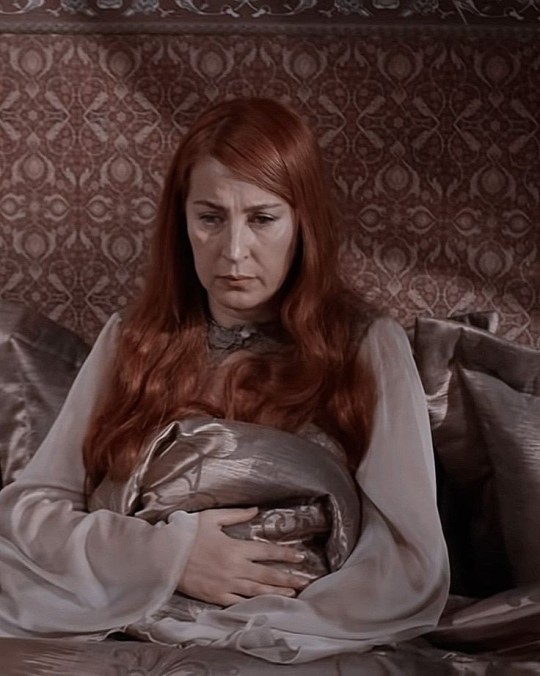
In the end they kidnap her. And send all these women to attract the attention of Suleiman and drive her crazy with jealousy. SMH.
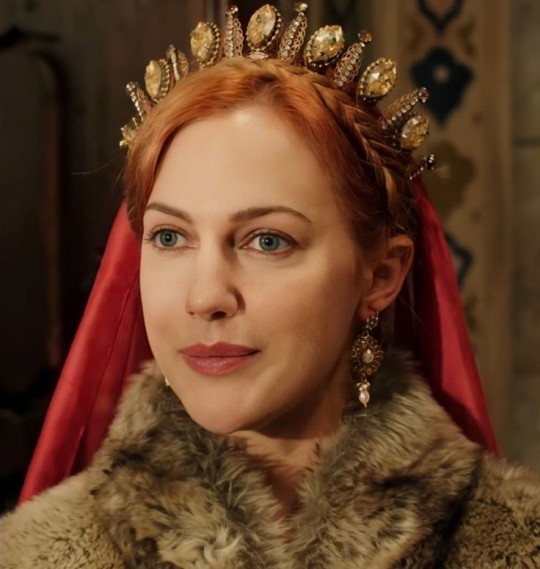
And you wonder why she schemed, plotted and lashed back in revenge? Pleez.
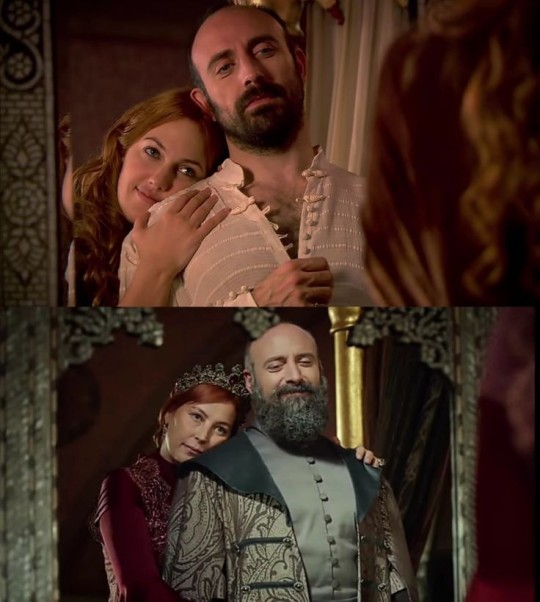
This is all in the context of a fictional Drama. Viewers have to realize a lot of these characters are made up and a lot of the events as well.
All in all however love wins.
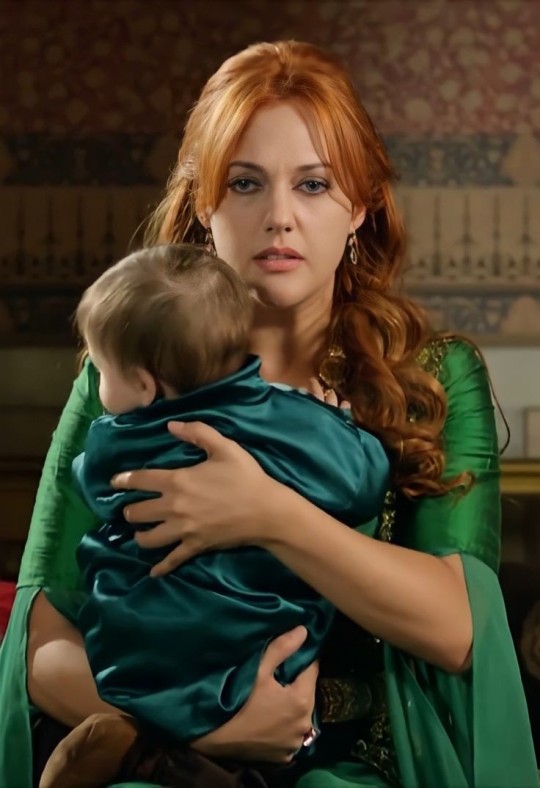
This is the fairytale story of Alexandra (Roxelana) Hurrem Sultan. She was a captured slave from Ruthenia? They're not even sure, but this was an area from Poland that is now part of Ukraine. They're not even sure of her name - some believe it was Anastasia. Unclear.
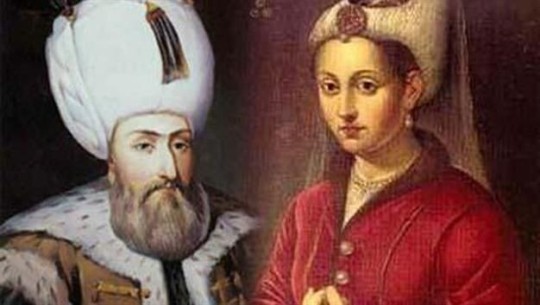
A captured slave, she ended up in the harem of Sultan Suleiman Khan. She went from slave to concubine to favorite to legal wife of a Sultan. Haseki Hurrem Sultan.
Amazing story and achievement.
She would lend her name to Haseki Hurrem Sultan foundation. She was responsible for the building of mosques, schools, hospitals, soup kitchens, a hammam (Turkish Bath) and more.
These public works and acts of charity helped women and children and poor people in general. Their reach went from unprecedented public works in Istanbul and even to Jerusalem.
Amazing. Simply amazing.
In her lifetime, people who didn't understand her, called her a witch, a sorcerer. That she charmed a Sultan into loving her and marrying her. People called her cruel and manipulative.
But the documents that have survived including letters to Suleyman indicate her deep affection for him.
I too am a history buff. I have a degree with a history major and am a stickler for details.
Everything I have read suggest that Suleiman was devoted to her, and was faithful. Something that broke the traditions of the harem.
Was she cruel as some historians suggest? To me that's debatable because it was forbidden to speak or relate what went on in a Islamic harem.
Any historical account too is only as reliable as the inherent bias of the storyteller. And men tended to speak badly of her. They didn't trust her, likely didn't understand how a smart, intelligent woman from a foreign land could achieve so much.
On anything like that, where is the proof? Without it, it's simply conjecture.
The deeds, her achievements with her charities and public works speaks volumes to me. She helped poor people particularly women and children. It's a good bet she never forgot where she came from.
She became the most powerful woman in the Ottoman Empire. That legacy speaks for itself.
And with the Sultan who loved her.
1502-1558
Haseki Hurrem Sultan.
#magnificent century#meryem uzerli#halit ergenc#vahide perçin#muhtesem yuzyil#haseki hurrem sultan#sultan suleiman khan#Suleyman#Hurrem Sultan
76 notes
·
View notes
Text
What did the Venetians say about them?
Did you know that most of the things we know about the cast of DoD come from what the Venetian bailo of Constantinople wrote in their letters and reports? And I happened to find a book which has the bailo reports from DoD's time frame.
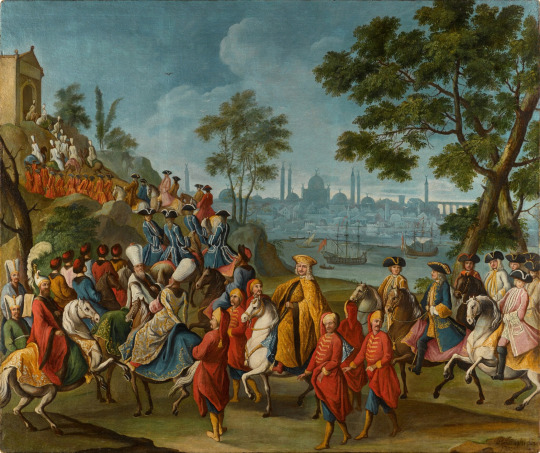
This was painted much later, but doesn't matter, it still shows how the fancy Venetians came to İstanbul. The fashion must have been different though.
Unfortunately, I was unable to find English versions of the letters (rather, I didn't bother looking), so I will just write some of my impressions and parts that striked me here. The baili and the other ad hoc ambassadors did not only write about the state of the Ottoman politics, army and economics, but they also left invaluable information on the key personalities of the Sublime Porte. The ambassadors mostly interacted with the Grand Vizier and the other viziers, so they wrote a lot of stuff about the characters and temperaments of them. I found out that the statement "he loved himself more than he did his lord" I previously quoted actually comes from Daniello de Ludovisi's report presented to the Venetian Senate in 1534 (quote found on p. 97 of my book). I would also like to quote him on Suleiman and İbrahim's relationship (p. 111). (Excuse me for sounding like an insufferable fujoshi, but they talk about İbrahim a lot because they were directly dealing with him. What else could they do? I should remind you that an ambassador saw the Sultan only twice: Once when they take up their duty, and once when they were leaving Constantinople at the end of their duty. During these visits, they couldn't even exchange words with the Sultan, but only kissed his hand while they were escorted by soldiers. But they could even become buddy-buddy with the viziers while fulfilling their official duties because they were the ones running the state affairs and communicating directly with the foreign ambassadors. İbrahim and later Rüstem were seen as the key to Suleiman's good graces.)
When the Sultan summons all his pashas and the officials of the court, he absolutely takes no decisions while İbrahim is not present. However, İbrahim can take whatever decision he likes alone, even when the Sultan is not present. For reasons I have previously mentioned, there are less and less retainers around the Sultan who give him good counsel and his army grows weaker. Things would be much better if the Turkish Beg was more cautious and careful about his circumstances, and took notice of these irregularities and tried to remedy them. Then his retainers too would rise to the challenge and do whatever they can for the Sultan. But when you take into account that the Sultan is indeed aware of all this, yet does nothing to change it because he loves İbrahim too much, you can say that his affection is not the respectable sort. On the contrary, it's a very dangerous emotion.
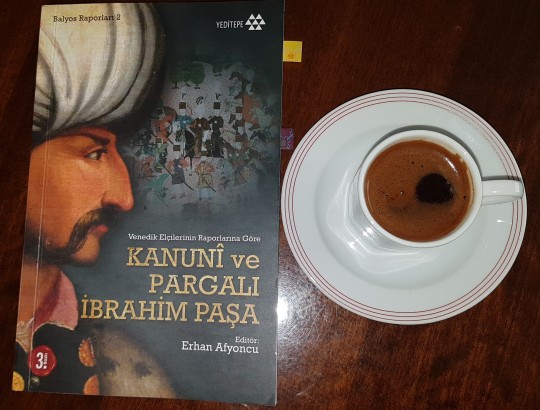
When you want to make a nice, foamy Turkish coffee but are denied... I respect bookgrammers now.
About Hürrem, they mostly talk about her children because they are very much interested in Suleiman's succssor. Pietro Bragadino informs us in 1526 that (p. 51) Suleiman prefers Hürrem over Gülbahar, and that Hürrem is young but not beautiful, yet cute and petite. Since Harem was out of bounds for them, their impressions are based on hearsay, yet still interesting.
I really liked these guys. They took their jobs seriously and did everything for the best interest of their state, La Serenissima, while being fully mindful of the Ottoman way of things and dynamics. 500 years later, our politicians are nowhere near as respectful as them. Read the baili reports if you happen to find them, because they give a very interesting insight on the time period.
There is also another book with the reports about Prince Mustafa, which is next on my reading list. Time for book shopping!
#shinohara chie#篠原千絵#yume no shizuku kin no torikago#夢の雫、黄金の鳥籠#drops of dreams#drops of dreams the golden birdcage#real history#book recommendation#venice#diplomacy
3 notes
·
View notes
Note
This ask got me thinking after one of your latest asks about Hurrem's suicide attempt. Do you think Hurrem's enemies( such as Mahidevran, Hatice, Ibrahim, Gulfem...) would start to be a little bit more sympatic towards to Hurrem if they learn her suicide attemps for Suleiman?(Like when Afife saved her in ep 72) I mean, Valide started to respect and understand her after she saw how much she really loved Suleiman and was willing to give her life for him. Also Afife started to understand her after saving her life. What do you think about the other enemies ? :)
It highly depends on the dynamic each one has with Hürrem individually, their own reasons for putting their foot down on her or being enemies with her, how much can that "new knowledge" move past these reasons and everyone's own individual view on Süleiman.
I feel the one who would sympathize with Hürrem the most in such circumstance would be Gülfem. She has experienced a level of loss and knows what it means to feel that life isn't worth living after that loss. If she learns, she would surely understand and perhaps say that, despite of everything, Hürrem is attached very strongly to Süleiman and has immense loyalty for him. She wouldn't condone Hürrem's other actions that don't sit well with her (like bringing Nigar in the harem only to spite Hatice, reminding her of the infidelity at every turn and even using Gülfem herself to frame Mahidevran for an assault in order to become the ruler of the harem since that was relatively soon), but would put the action into context in front of everyone.
This reaction would be helped by the fact that Gülfem isn't exactly her enemy per say, is very forgiving and patient, isn't used to holding grudges, and is only ever against Hürrem when she does something against her loved ones or she crosses some kind of a line by petty insults or comebacks. Besides, Gülfem still strives to see the good in Süleiman by this point of the show, being his emotional support and conscience even before S04 and becomes worried about what would happen to everyone every time he's ill, so such action of Hürrem's would be pretty explainable for her, even though she could certainly think that Firuze is something she had coming for her, and if they get a chance to talk about it in the depths of my headcanon, they would be the most possible "duo" to have a heart to heart.
Both Ibrahim and Mahidevran's perspectives have pretty much in many ways been shown by episode 55 where Hürrem prepares to do something pretty similar to her suicide attempt in episode 72, just with even more massive stakes.
A major part of the conflict between Hürrem and Ibrahim is rooted on Süleiman: his attention on both of them and the amount of influence Hürrem wants to exercise over him. However, the loyalties they have towards Süleiman is where they have managed to find common ground. Ibrahim is fully aware that Hürrem would never directly act against him. Him learning about a suicide attempt of Hürrem's due to the prospect of losing Süleiman would be nothing new to him, since, as highlighted by their confrontation in E55, he was aware that she was in such a state where she was willing to 'do the impossible'. They were both devastated by the ongoing events and they could come to a mutual understanding. It's possible for him to at least try to understand what she's going through there. But that would only last for so long, for the moment he learns about it. He would widen and maybe think, but... that would be about it. Because if Mahidevran directly acted before Valide hid the children and with SS's fate still being uncertain in E55, Hü and Ibro would have teamed up to stop this mess, but not here.
I once again come back to the comparatively more personal stakes of Hürrem's suicide in E72: this attempt wouldn't be enough to put everything between them behind, for Ibrahim to have such a strong amount of sympathy, none of this can be forgotten by a single suicide attempt. Their history is much longer than that. I would say that he would indeed think about the fact that Firuze is bothering Hürrem so much, wonder for a few seconds, how did it come to this, tell Matrakci about it and tell him that Hürrem must be very threatened to go for this, maybe with a hint of understanding... but that would be about it. It would be a temporary reaction, nothing between them or their dynamic would change in a significant way, he wouldn't get more sympathetic with Hürrem. Because that is a side of her Ibrahim has seen, on the possibility of another, scarier, more dangerous future for them both.
Mahidevran is the person who, is not only the least likely to, but surely, by one hundred percent, wouldn't sympathize with Hürrem over her suicide attempt at. all. Her hatred for Hürrem is seriously big and the points where they both could ever come to an understanding are rare. Some suicide attempt would seem something incredibly trivial and far too small to turn the tables. That is empowered even further by Mahidevran's own ongoing character arc that relates to Süleiman and the way her inner strength evolves by her letting go of him. At this point of the show, Mahidevran wouldn't even be able to relate to what Hürrem has done on a personal level, since Süleiman is nothing but memories to her already. It's not an experience she could connect herself with because of this exact shifting of priorities. What she wants even more at this point is Hürrem's end and she would be fine with however would it happen. {We could say she would generally prefer suffering for her (as she said in E55, but it's a belief confirmed again in E79, saying that death would only be a salvation for her spy; and then advanced even further in S04.), but is on board with killing her as well. (see her sending Diana to kill her)} I even imagine her to still widen at the news, but to wonder why did Afife even save her. (if they learn about that, too)
Despite of this, I feel there're a few angles of how precisely Mahidevran would view this suicide: the confrontation between Hürrem and her in front of SS's bed in E55 is key in her witnessing her say that it's namely dying with Süleiman that she would do if SS died anyway. And there we have Mahidevran claim that Hürrem doesn't do it out of love, but out of fear for her life. She could view Hürrem's suicide in E72 like this, too, and this way she would not only not sympathize with her for it, but also condemn her for doing it in some way. She may not read these intentions as genuine, she may even see it all as a plan of Hürrem's to win Afife over? There wasn't an indication that Mahidevran's view of these stunts of hers changed by that point, even though Mahidevran realized that her E55 actions were a mistake. The second angle of this could be the direct demonstration of her belief of the endless cycle of the harem that would never change. Yes, in E64 Mahidevran had stopped believing that another woman could defeat Hürrem (seen by her expression when Hatice told everyone that this is the only thing that would beat Hürrem), but seeing Firuze brought something else to the table. Then Mahidevran begins once again saying that Hü would burn in the same fire she did, calling back to her words in E61 that one woman would come and destroy this indestructible love. Seeing this realized with Firuze, seeing Hürrem struggle against her that much to the point of giving up, albeit in the opposite way Mahidevran did from SS... it would just show that Hürrem indeed isn't irreplaceable, that every good thing comes to an end, that Hürrem's victories wouldn't be endless and that she would doom herself one day. This could be a part of what Mahidevran wanted, confirming her beliefs of then, yet weakening her rival by a severe amount. Firuze having such an affect on Hürrem would by no means be approached sympathetically by Mahidevran, even if it hypothetically happened in the moment where it could (by that I mean early S01, in E10, when SS was rumored to be dead and if Hü tried such a thing then. And if, say, Firuze existed instead of Sadıka, ofc.), because even then Mahidevran's priorities would be immediately switched to the baggage little Mustafa had to deal with. Hürrem and Mahidevran had their few and far between moments of understanding, but that understanding was connected to their children and their motherly instincts. Only then would they be close to put their differences behind. Not here.
I find Hatice's possible reaction to be kind of a mix between what virtues she has seen in Hürrem before and their relationship in S03A's present. We know that Hatice completely stood against Hürrem because of her simultaniously threatening dynasty and family and what they stood for in Hatice's eyes. However, there have been two exceptions throughout S03A where Hatice actually sided with Hürrem or was shown to be empathetic to her. One of the exceptions was Süleiman falling ill once again in E78 where she was standing next to Hürrem and sharing her desire to see SS recover. That circumstance is similar to what E55 offered, because Hatice saw Hürrem in a better light, albeit for a moment in this case, while showing a loyalty to both the dynasty and the family that is Süleiman. That's where they're able to set their differences even in times where they are full on enemies. It is possible that Hatice may show a hint of understanding for Hürrem's suicide, because she is showing some kind of loyalty to Süleiman and after all, Hatice did once truly admire their love and even understood Hürrem's urge to send the Russian concubines off back in S01. She could understand why Hürrem did it and even empathize with it in part. It wouldn't be completely impossible, since she also has an idea of what it is like. But on the other hand, things have changed since S01: Firuze is the person Hatice counted on to take the win out of Hürrem's hands and Hatice was in such a state that she wanted Firuze to completely take over, which would make us think.
Nonetheless, learning of Hürrem's suicide attempt would definetly surprise Hatice, because even though she wanted for Firuze to take away Hürrem's Thursdays, such a reaction from Hürrem wouldn't be that expected and she would possibly view it as extreme even, since as I have said, Hatice didn't want to kill her in S03A. To knock her down a peg, to put her in her place, yes, but to want or expect such an ending for her, with her doing it herself.. I don't think so. She could even ask her is she okay and even thank Afife for saving her. Again, I don't think it would change their dynamic all that much, probably would keep a bigger eye on Firuze's moves?, but it would be a little moment of piece between them and Hatice could really sympathize. Because Hatice is still very human at her core.
[Side note: Ayşe Hafsa's dynamic with Hürrem changed so much after she saw Hürrem in E55, namely because she saw another side of Hürrem, virtues she didn't think she had and for the defense of which she stood up against Hürrem - again, the loyalty to dynasty and family. In E38, when she overheard her, she saw Hürrem marching against all of them by saying she would get rid of basically everyone and then her seemigly using SS's trust and love for her in cold calculation. In E55, she saw her love for SS in a different better light, a loyalty so strong and contrasting it negated every doubt Valide had against her and made her fully support her as a result. To be fair, the contrast with Mahidevran also helped, since Valide was conversely disappointed by a person she had an almost familial bond with and it's just that the occurrences in the whole episode were just so massive they made her switch from one side to another. Her son's future was put in question as much as her own.
Afife wasn't really an enemy of Hürrem's. She was more of a "lawful neutral" type of character: she helped with the Firuze case only because she was led to believe that Hürrem disrupted the balance in the harem and this balance could be fixed only through another woman. She told Hürrem off that one time, because Afife was so loyal to the laws she found herself to act by them and them alone, thus claiming that Hürrem isn't a Valide Sultan and Afife could arrange the entertainment regardless. (and also because the plot demanded it.) There wasn't any personal ire there. But Hürrem's suicide is something that touched her on a personal level, for she loves SS as her own son. That's once again, something she has never had the chance to see in her life, something new that moved her and made her more supportive of Hürrem and view Firuze in another way. Because after such event she couldn't help, but think: "Could Firuze do the bold thing the legal wife and the mother of his majesty's five kids just did?".]
#magnificent century#muhteşem yüzyıl#muhtesem yuzyil#hurrem sultan#mahidevran sultan#ibrahim pasha#hatice sultan#gulfem hatun#ayse hafsa sultan#afife hatun#ask#ganeshkfp#i may have gotten carried away 😅#but this was so interesting to think about!
25 notes
·
View notes
Text
representation is historically specific too
Last week, we spoke on the narcissistic devouring gaze where a one-to-one relationship between viewer/viewed is assumed in such a way that no interpretation is needed. I’m specifically interested in how the bodies of women are dematerialized in representation where the body transcends its materiality. In a sense, women’s bodies become the sublime that transcends its own located-ness.
I first want to go back a little to the reading by Huyssen in the first week. What stuck with me the most that week was the idea of the feminized masses, the fear of ‘woman’ as a threat to the social order. It stuck with me, I think, because I have seen the opposite side in a way. Not that the discourse “‘woman’ = masses” does not exert an incredible amount of force; but it travels differently.
In Egypt and in the Levant, engulfed in post/colonialism and deeply affected by the imaginary of Arabic-language cultures and Islamic cultures, “‘woman’ = masses”, is much more readily visible as “‘woman’ = revolution”.
Mahmoud Darwish, for example, (and many others like Amal Dunqul, Abdullatif Akl, and Nizar Qabbani, Salah Jahin, etc.) all wrote so many love poems (in the genre of Ishq) that aggressively disrupt the transcendental one-to-one relationship between viewer/viewed.
فلسطينية العينين والوشم
Her eyes and the tattoo on her hands are Palestinian,
فلسطينية الاسم
Her name, Palestinian,
فلسطينية الأحلام والهم
Her dreams, and sorrow, Palestinian,
فلسطينية المنديل والقدمين والجسم
Her Kerchief, her feet and body, Palestinian,
فلسطينية الكلمات والصمت
Her words and her silence, Palestinian,
فلسطينية الصوت
Her voice, Palestinian,
فلسطينية الميلاد والموت
Her birth and her death, Palestinian,
- Darwish; “A Lover from Palestine”
Relatively new artists such as Bu Kolthoum (and many more like Faraj Suleiman, El Far3i, El Morabba3, etc) carry on a similar tradition, especially in the wake of ‘Arab Spring’ and wars in Libya, Syria, Iraq, and Yemen.
youtube
Importantly, woman’s bodies are still dematerialized. The body must still transcend its own materiality, its own location. However, the devouring narcissistic gaze with its clear references to discourses of modernity cannot unilaterally (and productively) describe how women’s bodies are dematerialized. Indeed, the transcendence in Darwish’s poetry or Bu Kolthoum’s song is not entirely vacated of materiality. In fact, ‘woman’ is represented (imagined/viewed) as ‘land’, ‘homeland’, ‘migration’, ‘authenticity’, etc—all material discourses that are not as immediately collapsible onto the self of the devouring narcissistic gaze. Moreover, while the transcendence remains haunted by a sense of loss/death, its temporal implications are different. That is, ‘woman’ is not frozen in time, but, instead, gestures to a historic loss, a present claim to land, and a hopeful future return.
My point is, to circle back to Lury, is that the social and cultural are politically and historically specific. The representation of ‘woman’ requires a sense of located-ness exactly to counter-act the narrative of transcendence. How images/representations of ‘woman’ function, how they position the bodies of women, and how then they transcend said bodies are historically specific.
8 notes
·
View notes
Text
Portrait of Murad IV's daughters / IV. Murad lányainak portréi
Kaya Esmehan
Kaya was Murad IV’s most famous child, who Evliya said was a lioness, a worthy successor to her father. Evliya knew Sultan Murad well and closely followed Kaya’s life so we can trust him when he talks about Kaya. Based on these, we can assume that Kaya was of a similar nature to her father and grandmother, Kösem.
Kaya was born in Istanbul in 1633, certainly as the daughter Haseki Ayşe Sultan. Her father celebrated her birth with days of celebrations. Kaya's name is particularly interesting, as the name means "stone," and in a more abstract sense, "hard." We don’t know why Murad chose such a name for a newborn baby girl, maybe she was born in good health and looked tough compared to Murad's other children? To offset his peculiar name, Murad gave a much more dynastic name to her also, Esmehan. We don't know much about her childhood.
Kaya first came to the forefront in the 1640s when she was old enough to be married off. The selection of the husband was the responsibility of the Sultan and the mother of the child. The Valide Sultan must have had a word also, but it was not her who decided. We know, for example, that even though Nurbanu wanted to marry one of her granddaughters to a certain man, Safiye (the girl’s mother) prevented this. That is why there was nothing strange about Ayşe choosing a husband for Esmehan Kaya herself. The husband candidate was not particularly politically significant anyway. He was one of Murad's former sword-bearer, to whom Murad himself had promised Kaya before he died. So Kaya herself grew up considering the sword-bearer as her future husband. Kösem, however, did not agree with the decision. She wanted one of her own trusted men to be Kaya’s husband, a pasha who was loyal to her and who she could permanently chain to herself with the marriage. This is how she chose Melek Ahmed Pasha, who was roughly the same age as she was.
So Ayşe and Kösem fought to each other, but it is not known in detail how the war between the two women took place. Some say Ayşe tried to seek the help of Sultan Ibrahim, who, however, wanted to take advantage of the situation and wanted Ayşe for himself. In the end, this did not happen, so Kösem and her chosen one, Melek Ahmed Pasha won. The wedding took place in 1644, however, it wasn't in Kaya's mind to accept the pasha. On the wedding night, she wounded the man with a dagger and forbade him to touch her. Melek Ahmed did not force the matter and accepted Kaya's will. Some say Kösem eventually forced them to consummate the marriage, others said for a while Kösem also accepted Kaya’s decision.
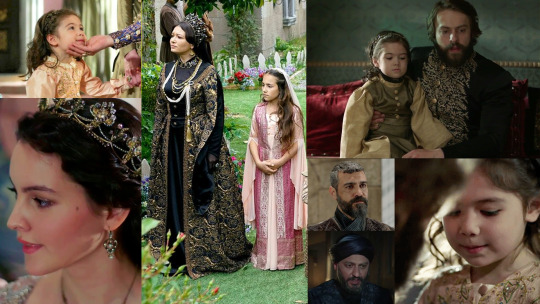
Kaya and Kösem were quite close to each other, she was Kösem's favorite grandchild, and this seriously affected her relationship with Sultan Ibrahim I, who followed her father on the throne and who was in a bad relationship with both Murad IV and Kösem. The new sultan made Kaya's life hell, for example in the late 1640s she was forced to serve his new wife, who was a slave-origin consort. Several contemporary sources report that Ibrahim, since Murad's death, has been constantly disturbing Kaya, and for this reason, Kösem tried to keep the girl away from Ibrahim. Based on this, we can assume that Kaya was relieved when Ibrahim was dethroned and executed. Soon, however, her life turned upside down.
In 1651, seven years after her marriage, Kösem finally forced Kaya to consummate the marriage with her husband. According to Evliya, Kaya did not want it because a future teller predicted that she would die during the birth of her daughter. Kösem wanted Kaya to forget this nonsense, that's why she forced her. Others said there was no compulsion, Kaya herself decided so. Finally, Kaya soon became pregnant and gave birth to her baby daughter, Afife Fatma. Kaya survived the birth, but Kösem could no longer see it, since in September 1651 her rival, the new Sultan Mehmed IV's mother killed her.
Due to her death, Kösem's huge charity did not stop, for Kaya took her place in many ways. She presumably learned charity from her grandmother, as she had a prominent number and size of foundations and regularly helped those in need with huge sums of money. Just as she was a worthy daughter of Murad, she was a worthy grandchild of Kösem. As the common charity also suggests, Kösem was close to Kaya and knew her quite well. Maybe that’s certainly why she chose Melek Ahmed as her husband. Besides her own political ambitions, she might have guessed that Melek Ahmed could be a good husband for Kaya. Eventually, her suspicion came true because a real love came out from the marriage of Melek Ahmed and Kaya. Melek Ahmed regularly piled up gifts for his sweetheart, and Kaya helped the pasha move forward in political fields. Kaya once set off while was heavily pregnant to warn her husband that someone wanted to assassinate him.
In such a loving and caring relationship, it’s no surprise that after her first successful birth, Kaya soon became pregnant again. Perhaps after the success of her first birth, she could have calmed down and thought the prophecy was wrong. However, this birth was no longer as easy as the birth of Afife. She was seven months pregnant when labor began and she gave birth to a premature baby. The child was named Ahmed but he died on the day he was born. Kaya survived childbirth and soon recovered.
Then in 1658 Kaya became pregnant again. This time, during her pregnancy, she had a strange dream that suggested that she would soon join to her grandfather, Ahmed I, and his brother, Mustafa I. Kaya’s labor soon began, and she gave birth to a girl after a long, difficult labor, however, the placenta did not leave her uterus after the child was born. Because of this, the midwives tried every existing method to remove the placenta from the sultana’s body. At first, they gave her herbs to drink, then some herbs were put into her uterus with water, to clean the placenta away. But when none of it worked, the midwives tried to pull out the placenta with their bare hands. Eventually, after four-day torture, Kaya died in her palace and her little daughter soon followed her.
Kaya was buried in the mausoleum of Ibrahim I at Mehmed IV's command. The place of the burial suggests that Mehmed and Kaya were not close to each other at all, since if Mehmed had been the least interested in the matter, he would certainly not bury Kaya next to Ibrahim, with whom they knowingly hated each other. It cannot be ruled out that after the assassination of Kösem, Kaya violated the Sultan or his mother in some way and that was the background of their relationship. During the funeral, Melek Ahmed Pasha fell to Kaya's coffin, crying loud and was unable to calm down. This kind of emotional outburst was very unusual for a guy and very not okay with the traditions. Melek Ahmed mourned his beloved wife for the rest of his life, even if he was forced to remarry over time.
As Kaya followed Kösem in charity, so did her daughter, Afife followed her. With the death of her mother, Afife took over the supervision of all her foundations as soon as she became old enough to do so. Like her mother and grandmother, she was a really charitable and generous person. She was married to a pasha named Suleiman, who already had two sons from his previous marriage. They had no children together with Afife. Afife Fatma Hanimsultan died in 1727 and was buried in the Şehzade Mosque Complex.
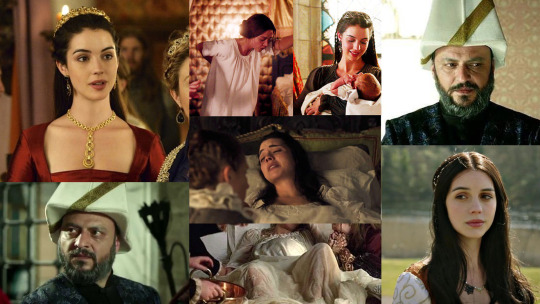
Safiye
The identity of her mother and date of birth are unknown, all that is known is that she was born after 1633. Her name is interesting, since Safiye, although occurring among dynastic names, was not common. In addition, Safiye Sultan, Murad IV’s great-grandmother, was not very popular in the period. First of all, it would be nice to know who named the little princess. As the exact date of birth is not known, this is difficult to say. If she was born during any of Murad's campaigns, she would certainly be named by Kösem. The name may suggest that perhaps Murad or Kösem liked or revered the famous sultana. We know that Kösem often visited Safiye during the reign of Ahmed I, perhaps she also took Murad with her on these journeys, so he had the opportunity to establish some kind of relationship with his great-grandmother.
She was married off by her cousin Mehmed IV in 1659 to the blonde Abaza Hüseyin Pasha, who was a relative of the reigning Grand Vizier Köprülü Mehmed Pasha. We don’t know much about their marriage, however, the fact that they had four children may indicate that their relationship was balanced. One son Ebu-Bekr died as a child and another son Sultanzade Mehmed Remzi Pasha (1660-1719) became an influential statesman. Mehmed Remzi Pasha was married and the Safiye Sultanzadelers can be traced back to him. The Safiye Sultanzadelers have been present in Ottoman history for centuries, and are mentioned by many even in the twentieth century, and perhaps some of them still live among us today. Along with two sons, Safiye and Abaza Hüseyin Pasha also had a daughter, Rukiye (before 1680 - 1697), who reached adulthood and was married to Murmedoglu Gürci Mehmed Pasha in 1694, but we know no more about her, as she soon died.
Safiye died in 1680 when she gave birth to her last child a premature baby. Along with Safiye, her son Abdullah also died. She was buried in the mausoleum of her grandfather, Ahmed I, along with her son. Her husband survived her for eight years.
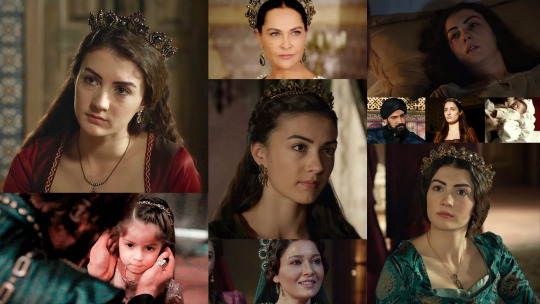
Rukiye
Rukiye was probably born in the last years of Murad IV's reign, perhaps in 1640. The identity of her mother is unknown. She was also married off by her cousin, Mehmed IV, to Şeytan Melek Divrikli Ibrahim Pasha in January 1663, with whom she had two children, Ayşe (? -1717) and Fatma (? -1727?). The date of birth of the girls is unknown, usually, they put it by the late 1670s, but it is more likely that they were born much earlier, shortly after the wedding of Rukiye and the pasha. We know a little more about Fatma's life than we know about Ayşe. Fatma's husband was Mısırlı Bıyıklı Mehmed Pasha, from whom a son was born, Mehmed Said.
Rukiye's husband died in 1685, but the widowed sultana probably married again soon. Although historians disagree on this, if she did remarry, Gürcü Mehmed Pasha was the chosen one. Similarly uncertain is the time of Rukiye's death, all we know is that it may have happened sometime between 1690 and 1703 and that she was buried in the Şehzade Mosque complex.
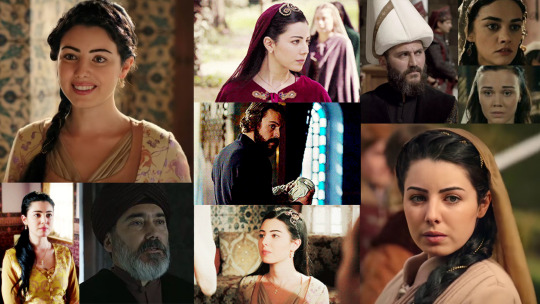
More daughters
Hanzade was born in 1631, but the identity of her mother is unknown. Her husband was Nakkaş Mustafa Pasha until the man's death in 1657. Their marriage remained childless and she did not remarry after widowhood. She died in 1675.
The identity and date of birth of Ayşe's mother are also unknown. Before 1655 he married Malatuk Süleyman Pasha but we don't know any more about her.
An anonymous sultana, who was born in 1627, married Tüccarzade Mustafa Pasha in 1640.
Another anonymous sultana married Ammarzade Mehmed Pasha before 1648, but we know nothing else about her.
In addition to the former girls, Murad had other daughters who died as children, such as Hafsa, of whom we know nothing, and Esmehan, who was born before 1633 and, according to some, died as an infant, before 1633. But since she was buried in the mausoleum of Mustafa I, it arises that she died after Mustafa's death in 1639. It wouldn't be logical to rebury her in Mustafa's tomb while all of Murad's other children are buried where they were originally buried. Some say Murad also had a daughter named Gevherhan, while others think she was Ibrahim's daughter, anyhow she died as a child.
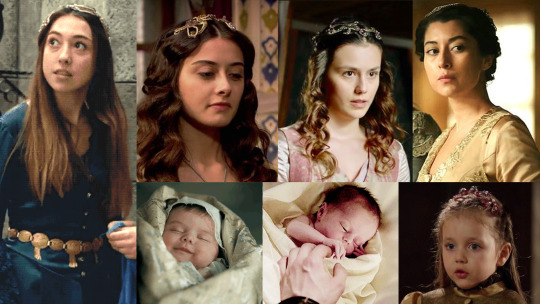
Used sources: L. Peirce - The Imperial Harem; N. Sakaoğlu - Bu Mülkün Kadın Sultanları; R. Dankoff - The Intimate Life of an Ottoman Statesman; R. Dankoff - An Ottoman Mentality: The World of Evliya Çelebi; Du Loir - Les voyages du sieur Du Loir; Y. Öztuna - Sultan Genç Osman ve Sultan IV. Murad; J. Dumas - Les perles de nacre du sultanat: Les princesses ottomanes; C. Finkel - Osman's Dream: The Story of the Ottoman Empire; Y. Öztuna - Devletler ve Hanedanlar; Uluçay - Padişahların Kadınları ve Kızları; F. Davis - The Palace of Topkapi in Istanbul; G. Junne - The black eunuchs of the Ottoman Empire
* * *
Kaya Esmehan
Kaya volt IV. Murad leghíresebb gyermeke, aki Evliya szerint egy igazi oroszlán volt, méltó utódja apjának. Evliya jól ismerte Murad szultánt és alaposan nyomon követte Kaya életútját, így hihetünk neki, mikor Kayáról beszél. Ezek alapján azt sejthetjük, hogy Kaya hasonló természetű volt, mint apja és nagyanyja, Köszem.
Kaya 1633-ban született Isztambulban, minden bizonnyal Haszeki Ayşe szultána lányaként. Születését apja napokon át tartó mulatsággal ünnepelte meg. Kaya neve különösen érdekes, hiszen a név jelentése "kő", elvontabb értelemben pedig "kemény". Nem tudjuk, hogy Murad miért választott ilyen nevet egy újszülött kislánynak, talán többi gyermekéhez képest jó egészségben született és keménynek tűnt? Hogy különös nevét ellensúlyozza Murad egy sokkal dinasztikusabb nevet, az Esmehant is a Kaya mellé tette. Gyermekkoráról nem sokat tudunk.
Kaya először az 1640-es években került a figyelem középpontjába, mikor elég idős lett a kiházasításhoz. A férj kiválasztása a mindenkori szultán és a gyermek édesanyjának feladata volt. A Valide szultánának minden bizonnyal szintén lehetett szava, ám nem ő döntött. Tudjuk például, hogy Nurbanu hiába szerette volna egyik unokáját egy bizonyos férfihoz adni feleségül, Safiye (a lány anyja) ezt megakadályozta. Épp ezért nem volt abban semmi furcsa, hogy Ayşe maga válasszon férjet Esmehan Kaya számára. A férjjelölt egyébként nem volt különösen jelentős politikai szempontból. Murad egyik korábbi fegyverhordozója volt, akinek még maga Murad ígérte oda Kayát, mielőtt meghalt volna. Kaya maga úgy nőtt fel tehát, hogy a fegyverhordozót tekintette jövendőbeli férjének. Köszem azonban nem értett egyet a döntéssel. Saját emberei közül akart valakit Kaya férjéül, egy olyan pasát, aki hűséges hozzá és akit végleg magához láncolhat a házassággal. Így esett a választása a nagyjából vele egy idős Melek Ahmed Pasára.
Ayşe és Köszem egymásnak feszültek tehát, de nem tudni részletekbe menően, hogyan zajlott a két nő közötti háború. Egyesek szerint Ayşe igyekezett Ibrahim szultán segítségét kérni, aki azonban ki akarta használni a helyzetet és magának akarta Ayşét. Végül ez nem történt meg, így győzött Köszem és a választottja Melek Ahmed Pasa. Az esküvőre 1644-ben került sor. Kayának esze ágában sem volt azonban elfogadni a pasát. A nászéjszakán egy tőrrel sebesítette meg a férfit és megtiltotta neki, hogy hozzáérjen. Melek Ahmed nem forszírozta a dolgot és elfogadta Kaya akaratát. Egyesek szerint Köszem végül erőszakkal rávette őket, hogy elhálják a nászt, mások szerint egy időre Köszem is elfogadta Kaya döntését.

Kaya és Köszem meglehetősen közel álltak egymáshoz, ő volt Köszem kedvenc unokája, ez pedig komolyan befolyásolta viszonyát az apja után trónrakerülő I. Ibrahimmal. Az új szultán pokollá tette Kaya életét, az 1640-es évek végén például arra kényszerítette, hogy feleségét szolgálja. Több korabeli forrás is beszámol arról, hogy Ibrahim, Murad halála óta folyamatosan kipécézte magának Kayát és emiatt Köszem igyekezett a lányt távol tartani Ibrahimtól. Ez alapján feltételezhetjük, hogy Kaya megkönnyebbült, mikor Ibrahimot trónfosztották és kivégezték. Hamarosan azonban élete fenekestül felfordult.
1651-ben, hét évvel házassága megköttetése után Köszem szultána végül kényszerítette Kayát, hogy elhálja a nászt férjével. Evliya szerint Kaya azért nem akarta elhálni a nászt a pasával, mert egy álomfejtő (vagy jövendő mondó) azt jósolta neki, hogy lánya születésébe fog belehalni. Köszem a kényszerítéssel azt akarta elérni, hogy Kaya elfelejtse ezt a nonszensz gondolatot. Mások szerint nem volt semmi kényszer, Kaya maga döntött így. Végül aztán Kaya hamarosan teherbe esett és világra hozta kislányát, Afife Fatmát. Kaya túlélte a szülést, Köszem azonban ezt már nem láthatta, hiszen 1651 szeptemberében vetélytársa, az új szultán IV. Mehmed anyja meggyilkoltatta.
Köszem halálával nem szűnt meg hatalmas jótékonykodása, Kaya ugyanis sok szempontból átvette a helyét. Feltehetőleg nagyanyjától tanulta a jótékonykodást, ugyanis kiemelt számú és méretű alapítványa volt és rendszeresen segítette a szükségben szenvedőket hatalmas összegekkel. Mint ahogy méltó lánya volt Muradnak, úgy méltó unokája Köszemnek. Mint a közös jótékonykodás is sugallja, Köszem meglehetősen jól ismerte unokáját, és minden bizonnyal épp emiatt választotta számára Melek Ahmedet férjül. Saját politikai ambíciói mellett úgy sejthette, Melek Ahmed jó férje lehet Kayának. Végül sejtelme beigazolódott, mert Melek Ahmed és Kaya között valódi szerelem és bajtársiasság szövődött. Melek Ahmed rendszeresen halmozta el ajándékokkal kedvesét, Kaya pedig minden módon segítette a pasa előremenetelét. Kaya egyszer mindenórás terhesen indult útnak, hogy figyelmeztesse férjét, hogy valaki az életére akar törni.
Egy ilyen szerelemre és bizalomra épülő kapcsolatban nem meglepő, hogy az első sikeres szülés után Kaya hamarosan újra várandós lett. Talán az első szülés sikere után megnyugodhatott és azt hihetette a prófécia téves volt. Ez a szülés azonban már korántsem volt olyan felhőtlen, mint Afife születése. Hét hónapos terhes volt, amikor beindult a szülés és egy koraszülött fiút hozott világra. A gyermeket Ahmednek nevezték el, ám még születése napján meghalt. Kaya túlélte a szülést és hamarosan felépült.
1658-ban aztán Kaya újra várandós lett. Ezúttal terhessége alatt különös álmot látott, mely azt sugallta hogy hamarosan csatlakozni fog nagyapjához I. Ahmedhez és annak öccséhez, I. Musztafához. Kaya szülése hamarosan beindult és hosszadalmas, nehéz szülés után egy kislánynak adott életet, azonban a méhlepény nem távozott a gyermek születését követően. Emiatt a bábák minden létező módszert megpróbáltak, hogy eltávolítsák a méhlepényt a szultána testéből. Eleinte gyógyfőzeteket itattak vele, aztán a gyógyfőzeteket a méhébe juttatták, de amikor ez sem járt eredménnyel puszta kezükkel próbálták kihúzni a méhlepényt. Végül négy napos tortúra után Kaya meghalt, kislánya pedig hamarosan követte őt.
Kayát IV. Mehmed parancsára I. Ibrahim mauzóleumába temették el. A temetés helye sugallja, hogy Mehmed és Kaya egyáltalán nem álltak egymáshoz közel, hiszen ha Mehmedet a legkevésbé is érdekelte volna a dolog, Kayát biztosan nem Ibrahim mellé temeti, akivel tudottan gyűlölték egymást. Nem zárható ki, hogy Köszem meggyilkolása után Kaya valamilyen módon megsértette a szultánt vagy annak édesanyját és ez állt viszonyuk hátterében. A temetés alatt Melek Ahmed Pasa a szokásokat megsértve zokogva borult Kaya koporsójára és képtelen volt megnyugodtni. Az ilyesfajta érezelmi kitörés nagyon nem volt szokás egy pasától. Melek Ahmed élete végéig gyászolta szeretett feleségét még akkor is ha idővel kényszerítették az újra nősülésre.
Ahogy Kaya Köszem örökébe lépett, úgy lépett lánya Afife Kaya örökébe. Anyja halálával ő vette át minden alapítványának felügyeletét, amint elég idős lett ehhez. Anyjához és nagyanyjához hasonlóan igazán jótékony személy volt. Egy Szulejmán nevű pasához adták feleségül, akinek már volt két fia előző házasságából, Afifével nem született közös gyermekük. Afife Fatma Hanimszultána 1727-ben halt meg és a Şehzade mecsetkomplexumban temették el.

Safiye
Safiye szultána édesanyjának kiléte és születési ideje nem ismert, annyit tudni, hogy 1633 után jött világra. Neve érdekes, hiszen a Safiye bár előfordult a dinasztikus nevek között, nem volt gyakori. Emellett Safiye szultána, Murad dédnagyanyja nem volt túl népszerű a korszakban. Először is jó lenne tudni, hogy ki nevezte el a kishercegnőt. Mivel pontos születési ideje nem ismert, ezt nehéz megmondani. Ha Murad valamelyik hadjárata alatt jött világra, minden bizonnyal Köszem nevezte el. Az elnevezés utalhat arra, hogy talán Murad vagy Köszem kedvelte és tisztelte a híres szultánát. Azt tudjuk, hogy Köszem gyakran látogatta Safiyét még I. Ahmed uralkodása alatt, talán ezen utakra Muradot is magával vitte, így annak lehetősége volt valamilyen viszonyt kialakítani dédnagyanyjával.
Unokatestvére, IV. Mehmed házasította ki 1659-ben a szőke Abaza Hüseyin Pasához, aki szegről végről a nagyvezír Köprülü Mehmed Pasa rokona volt. Házasságukról nem sokat tudunk, azonban az, hogy négy gyermekük is született arra utalhat, hogy kiegyensúlyozott volt a kapcsolatuk. Egyik fiuk Ebu-Bekr gyermekként elhunyt, másik fiuk Sultanzade Mehmed Remzi Pasa (1660-1719) pedig befolyásos államférfi lett. Mehmed Remzi Pasa megházasodott és tőle eredeztethetőek a Safiye Sultanzadelerek, akiknek családja évszázodik jelen volt az Oszmán történelemben, a huszazdik században is többen említést tesznek róluk és talán ma is köztünk élnek. Safiyének és Abaza Hüseyin Pasának két fiuk mellett született egy lányuk is Rukiye (1680 előtt - 1697), aki megérte a felnőttkort és 1694-ben kiházasították Muruloglu Gürci Mehmed Pasához, többet azonban nem tudunk róla, mivel hamarosan meghalt.
Safiye 1680-ban hunyt el, amikor utolsó gyermekét hozta világra koraszülöttként. Safiyével együtt a fia, Abdullah is meghalt. Nagyapja, I. Ahmed mauzóleumában temették el fiával együtt. Férje nyolc évvel élte túl.

Rukiye
Rukiye valószínűleg Murad utolsó éveiben született, talán 1640-ben. Édesanyja kiléte nem ismert. Őt is unokaöccse IV. Mehmed házasította ki 1663 januárjában Şeytan Melek Divrikli Ibrahim Pasához, akivel két gyermeke született, Ayşe (?-1717) és Fatma (?-1727?). A lányok születési ideje nem ismert, általában az 1670-es évek végére teszik, ám valószínűbb, hogy jóval hamarabb, az esküvő után nemsokkal születtek. Fatma életéről valamivel többet tudunk, mint Ayşéről. Fatma férje Mısırlı Bıyıklı Mehmed Pasa volt, akitől egy fia született Mehmed Said.
Rukiye férje 1685-ben meghalt, az özvegy szultána valószínűleg azonban hamarosan újra férjhez ment. A történészek bár nem egyeznek ebben, ha mégis újra férjhez ment, akkor Gürcü Mehmed Pasa volt a kiválasztott. Hasonlóan bizonytalan Rukiye halálának ideje, annyit tudunk, hogy 1690 és 1703 között valamikor történhetett és hogy a Şehzade mecset komplexumban temették el.

További lányai
Hanzade 1631-ben jött világra, édesanyjának személye azonban nem ismert. Férje Nakkaş Mustafa Pasa volt, egészen a férfi 1657-es haláláig. Házasságuk gyermektelen maradt és Hanzade megözvegyülése után sem ment újra férjhez. 1675-ben halt meg.
Ayşe édesanyjának kiléte és születési ideje sem ismert. 1655 előtt ment férjhez Malatuk Süleyman Pasához.
Egy névtelen szultána, aki 1627-ben született 1640-ben ment férjhez Tüccarzade Mustafa Pasához.
Egy másik névtelen szultána Ammarzade Mehmed Pasa felesége lett 1648 előtt, de nem tudunk semmi mást róla.
Az előbbi lányok mellett Muradnak voltak további lányai, akik gyermekkorukban haltak meg, így például Hafsa, akiről semmit sem tudunk és Esmehan, aki 1633 előtt született és egyesek szerint csecsemőként meg is halt. Ám mivel I. Musztafa mauzóleumában helyezték örök nyugalomra felmerül, hogy Musztafa 1639-es halálát követően halt meg ő is. Nem lett volna ugyanis logikus a lányt újratemetni Musztafa mauzóleumában, hiszen Murad többi gyermekét sem temették soha újra. Mind ott nyugszanak, ahová eredtileg temették őket. Egyesek szerint Muradnak volt egy Gevherhan nevű lánya is, mások szerint ez a gyermek Ibrahimé volt, akárhogy is a kislány gyermekkorában meghalt.

Felhasznált források: L. Peirce - The Imperial Harem; N. Sakaoğlu - Bu Mülkün Kadın Sultanları; R. Dankoff - The Intimate Life of an Ottoman Statesman; R. Dankoff - An Ottoman Mentality: The World of Evliya Çelebi; Du Loir - Les voyages du sieur Du Loir; Y. Öztuna - Sultan Genç Osman ve Sultan IV. Murad; J. Dumas - Les perles de nacre du sultanat: Les princesses ottomanes; C. Finkel - Osman's Dream: The Story of the Ottoman Empire; Y. Öztuna - Devletler ve Hanedanlar; Uluçay - Padişahların Kadınları ve Kızları; F. Davis - The Palace of Topkapi in Istanbul; G. Junne - The black eunuchs of the Ottoman Empire
#Murad IV#rukiye sultan#esmehan kaya#esmehan sultan#Kösem sultan#mahpeyker kösem#ayşe haseki#haseki ayşe#melek ahmed#hanzade sultan#safiye sultan#Mehmed IV#Turhan Hatice Sultan#ibrahim I
43 notes
·
View notes
Note
Do you think that Hatice and Ibrahim ever really had known each other? She had never known about his sadistic side nor did she completely understand his ambitions. Did any romantic partners in the show truly knew each other? Hürrem idealizes Süleyman. Mahidevran idealizes Süleyman. Nigar obviously idealizes Ibrahim. Mihrimah and Taşlıcalı are Hatice and Ibrahim version 2, their love is entirely built on poetry and idealization. As of Season 3 the only equal and semi-healthy relationship so far had been Aybige and Bali Bey, as boring as they were - and Bali Bey was THE WORST with Armin, if he is respectful to Aybige that’s because he is in grief and she is headstrong and a princess, not that he respects women. Helena and Mustafa started off semi-equal too since he didn’t introduce himself as a Şehzade but slowly was made into normal Harem stuff. I am also hopeful about Nurbanu and Selim, as far as I can understand they are more partners in crime than the other couples.
It’s no doubt entirely unintentional on the part of the writers, but it really is an ingrained theme of the show that almost all the partners' “great” romances fall, not for their partner’s true selves, but often heavily idealized version of what the other person represents for them.
The cases of this that could perhaps be understood the most are with the women enslaved into the harem. But, truth be told, I think there’s an argument to be made that both Mahidevran and Hürrem have moments where the scales fall from their eyes regarding Suleiman.
Unlike with Hürrem or other harem girls, such as Nurbanu, there are only ever glimpses given of Mahidevran’s time spent within Suleiman’s princely harem. And, even in those moments, it’s of a girl who has adjusted to the life she has found herself in. She’s presented, even in the past, as an established member of the harem without any hints of her life before.
From this, my growing opinion has been that Mahidevran replaced what she lost with her position in Suleiman’s family. It’s why it wounds her so much to be reminded by Hafsa or Hatice that she’s an “outsider” and plays an even bigger part in why she latches on so hard to Suleiman when his affections continue to cool.
To lose Suleiman, to lose her position, is to lose twice.
Neither Hafsa or Hatice are prepared to place Mahidevran aside in the same way, however, allowing her to still have that sense of belonging. That’s her power base, even if she’s never able to entirely emulate it again with any of Suleiman’s other sisters (I’d argue by that point she’d also outgrown that part of herself but that’s another story).
It’s a hard sell, I realize, to say that Hürrem doesn’t idealize Suleiman. But, in the end, I think that Suleiman’s line about her not being an angel, that no one is, can also be applied to how she feels about him. She loves him in spite of his flaws and, even more than that, she needs him, her children need him.
Now to shift to Hatice and Ibrahim, I think there was a brief window of time where they came close to truly understanding one another. After Hatice decides not to divorce Ibrahim after all, she attempts to enter the intrigues of the harem earnestly for the first time (it’s where she tries and fails to be her mother but that’s a whole other story). In that time, she even positions (or tries to) Nigar as an agent of hers; something that baffles (could we say it impresses?) Ibrahim as it’s a level of ruthless praticiality she’s not displayed before. But then it’s revealed that there are still secrets (this time in the form of Hatice lying about Nigar’s daughter with Ibrahim) that bring them right back to the start. And, of course, Hatice hyper idealizes the memory of Ibrahim after his death in the most unhealthy of ways.
Unfortunately, almost all of Mihrimah’s romances were a bust for me, falling into the same “um, this could’ve been done better, let’s list the ways…” category for me as many of the şehzade romances. Except, fascinatingly enough, Defne and Bayezid as much as Nurbanu and Selim. In those partnerships, there wasn’t really any of the “mechanications behind the scenes” or, at least, not any that weren’t caught out and made to be explained and resolved.
Mind you all of this is made even more interesting to me that, in doing research for this, I found a YT comment (English channel, of course) saying that Hatice was "as cruel" as Ibrahim which meant they "deserved each other". Which...huh. It seems fairly established that there are levels of cruelty that Hatice herself could never sink to (such as everyone agreeing she couldn't kill a child).
10 notes
·
View notes
Note
How do you think not having any legitimate brothers affected Suleiman's view on his son's and the fratricide law?
I think it made him a lot more distant and removed from the fratricide law than his sons were. It was a lot easier for him to ignore it, or see it as a necessary evil for the sake of the empire's stability. He didn’t want his sons to fight, but so long as it was in his presence. He did absolutely nothing to end the conditions that caused the fighting in the first place. When really he was the only one in the position to end the fratricide law.
8 notes
·
View notes
Photo
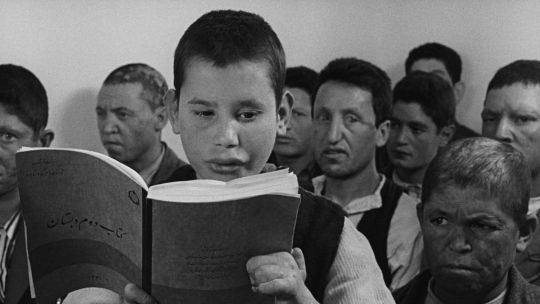
Sculpting in Time.
As the world inches into the future, we invited Justine Smith, author of the ‘100 Films to Watch to Expand your Horizons’ list, to look to the cinematic past to help us process the present.
It is said that the essential quality of cinema that distinguishes it from other arts is time. Music can be played at different tempos, and standing in a museum, we choose how many seconds or hours we stand before a great painting. A novel can be savored or sped through. Cinema, on the other hand, exists on a fixed timeline. While it can theoretically be experienced at double or half speeds, it is never intended to be seen as such. Cinema’s fundamental quality is experiencing time on someone else’s terms. As the great Andrei Tarkovsky said in describing his work as a filmmaker, he was “sculpting in time”.
The perception of time, however, is not universal. Our moods, our emotions, and our ideologies shape our relationship to it. Most Western audiences are further acclimated to Western cinema’s ebbs and flows, which similarly favor efficiency and invisibility. When we see a Hollywood film, we don’t want the story to stop. We want to be swept away and forget that we are all moving towards a mortal endpoint. Cinema, though, in its infinite possibilities, exists far beyond these parameters. It can challenge and enrich our vision of the world. If we open ourselves up, we can transfigure and transform our relationship to time itself.
When I first put together my 100 Films to Watch to Expand your Horizons list, I did it quite haphazardly. I imagined countries, filmmakers and experiences that I felt went under-appreciated in discussions of cinema’s potential. Intuitively, I went searching for corners of experience that expanded my own cinematic horizon. Some of these films are well-loved and seen by wide audiences; others are virtually unknown. It was often only after the fact that the myriad of intimate connections between the films came to light.

Manuel de Oliveira’s ‘Visit, or Memories and Confessions’ (2015).
“The only eternal moment is the present.” —Manoel de Oliveira
Released in 2015 but made in 1982, Visit, or Memories and Confessions is a reflection on life, cinema and oppression by Portuguese filmmaker Manoel de Oliveira. If we were to reflect on cinema’s history, few filmmakers have the breadth of experience and foresight as Oliveira. His first film was made in the silent era using a hand-cranked camera. By the time of his death at 106 years of age, he had made dozens of movies, including many in a digital format.
He made Visit, or Memories and Confessions in the shadow of the Portuguese dictatorship. While filming, he imagined he was in the twilight of his life. It revisited essential incidents in his history but also that of his country. It’s a film of reconciliation, violence and oppression, told tenderly in a home lost as a consequence of a vindictive dictatorship. Oliveira’s film, like his life, spanned time in a way that stretches perceptions. It’s a film without significant incident, about the peaceful pleasures and tragedies of daily life.
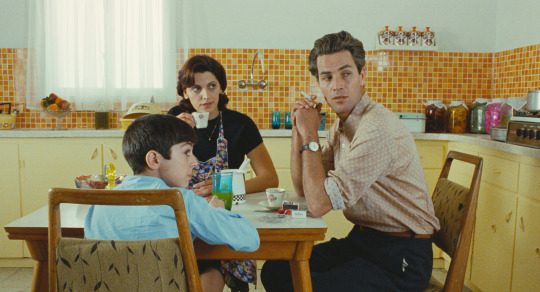
Elia Suleiman’s ‘The Time that Remains’ (2009).
What worlds have changed over the past one hundred years? The same breadth of perception, which often feels too seismic to tackle in traditional narrative cinema, was also explored in The Time that Remains. In a retelling of his family’s history, Palestinian filmmaker Elia Suleiman also tells Israel’s story. It is a film of wry comparisons and Keatonesque comic patterns. As borders change and time passes, few things fundamentally change, except on a spiritual plane. What happens to people without an identity or a country? What damage does it do to their souls?
The question of time looms heavily in both Oliveira’s and Suleiman’s films. They are movies that contemplate centuries of experiences and explore how those stories are guarded, twisted and erased by the powerful.

Alanis Obomsawin’s ‘Incident at Restigouche’ (1984).
The echoes of history and attempts to break with old patterns often emerge in other anti-colonial and anti-imperialist films. They can be seen in Alanis Obomsawin’s vital and angry Incident at Restigouche, about an explosive, centuries-in-the-making 1981 conflict between Quebec provincial police and the First Nations people of the Restigouche reserve; In Lagaan: Once Upon a Time in India, villagers must win a cricket match to free themselves from involuntary servitude; and in Daughters of the Dust, the languid pace of the Gullah culture is challenged by the promise and violence of the American mainland.
Time, more than just a tool for chronology, becomes in itself a tool for oppression. Those who control time maintain power. If we are to break with dominant histories, the rhythms of oppression must be broken and challenged.
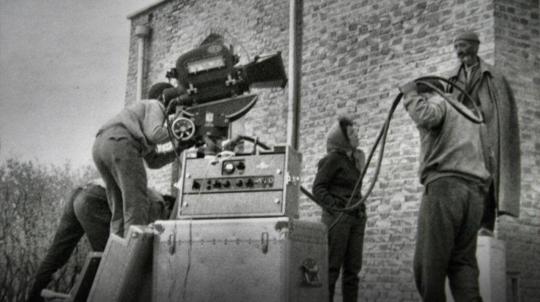
Forugh Farrokhzad’s ‘The House is Black’ (1963).
“The universe is pregnant with inertia and has given birth to time.” —Forugh Farrokhzad, The House is Black
Persian filmmaker and poet Forugh Farrokhzad made just one film before her untimely death in a car accident when she was 32. The House is Black is a short documentary about a Leper colony, which utilizes essay-esque prose taken from the Quaran, and Farrokhzad’s poetry. It is a film about people who are seen as invisible by society at large, cast away and hidden. The film reflects on beauty, sickness and reconciliation. How does one experience time when you’ve been ostracized and cut off from the larger world?
Barbara Loden’s landmark independent film Wanda asks a similar question. A solo mother who cycles from one abusive situation to the next exists outside of time and space. She is invisible. If we look at most American cinema, it might as well be propelled by people who take control over their destiny, but what of the people who are (un)willingly passive to the whims of society and other human beings? In her powerlessness, Wanda stands in for the invisible labor and sacrifices of so many other women. The ordinariness of Wanda’s life, the dusty and dirty environments she inhabits, rebound with significance. It is, however, not a victorious film. Instead, it is a profound portrait of loss and beauty. It’s the only film Barbara Loden ever made.
"If you don't want anything you won't have anything, and if you don't have anything, you're as good as dead." —Norman Dennis in Wanda

Barbara Loden’s ‘Wanda’ (1970).
In 2020, it seemed all we had was time. What seemed like an opportunity quickly became horrific. Time became a burden. We were reminded of our finite time on this Earth and all the hours spent commuting, working and surviving. The pandemic has had a seismic impact on our perceptions. In processing the ongoing crisis, we’ve transformed our relationship to the passage of time. We’ve altered the state of our reality.
This new pandemic gaze offers us new perspectives on time and history. The oldest film on the list is Erich Von Stroheim’s Blind Husbands, released in 1919 during the grips of the Spanish flu. The film does not reference the event, but its sensuality and class conflicts speak to a world on the brink of seismic change. It is a movie about an Austrian military officer who seduces a surgeon’s wife. The men grapple with jealousy and violence on a literal mountaintop, fighting for survival in an increasingly mechanized society.

Poster for Erich Von Stroheim’s ‘Blind Husbands’ (1919).
To this day, Blind Husbands is shocking. It’s profoundly fetishistic and loaded with heavy sexual imagery. It’s a movie about touch and desire absent of love and affection. It speaks to aspects of current life that feel lost and impenetrable. It speaks to growing and changing social disparities as well. Surviving the modern world is more than just surviving the plague; it has to do with value compromises and shifting power dynamics.
But, a pandemic is also about loss. Gregg Araki’s 1992 film The Living End explores the AIDS crisis from the inside out. Rebellious and angry, the film is about a gay hustler and a movie critic, both of whom have been diagnosed with the HIV virus. With characters who are cast out from society at large, gripped with a deadly and unknown fate, The Living End is apocalyptic—much like other Araki works from the 90s, such as The Doom Generation and Totally Fucked Up. It captures the deep sense of hopelessness of experiencing a pandemic while also belonging to a marginalized group. What is so radical about Araki’s cinema, though, is that it is also fun. It is a film that transcends mourning and becomes a lavish punk celebration. It is a film about survival, out of step with dominant ideology and histories.

Gregg Araki's ‘The Living End’ (1992).
The connections between Blind Husbands and The Living End bridge together to form common passions and changing perceptions. Both films are products of their time, at once part of distant histories but also uncomfortably prescient. More than films about a specific time and place, they are transformed by the time we live in now. To watch and connect with these movies in a pandemic means looking and living beyond the current moment.
While it seems like cinema might be facing an especially precarious future, it feels like the ideal art form to process what is happening right now. Caught in the vicious patterns of our own creation, giving ourselves up to the rhythms of someone else’s will might be a necessary form of healing, as well as an ongoing project in compassion. Time does not have to be a prison; it can be an agent for liberation.
Related content
100 Films to Watch to Expand Your Horizons
The Oxford History of World Cinema
1001 Movies You Must See Before You Die
The Great Unknown: High Rated Movies with Few Views
Follow Justine on Letterboxd
#justine smith#justine peres smith#world cinema#expand your horizons#gregg araki#manoel de oliveira#elia suleiman#julie dash#alanis obomsawin#Forugh Farrokhzad#barbara loden#erich von stroheim#mubi#criterion#criterion collection#letterboxd
15 notes
·
View notes